#(for example: he still thinks about the tragedy as ultimately a good thing. especially now that it allowed him to be happy)
Explore tagged Tumblr posts
Text
Slowburn (7) Masterlist
part one, part two, part three, part four, part five, part six
blown again into instant flame (ao3) - jonsaremembers
Summary: Dan reappears in the corner of Phil’s vision, wearing the green suit.
I’m fucked, is all Phil can think.
Because Dan is awfully fit for someone stuffed bodily into a green morph suit. Even the way the hood squashes his curls down and out over his forehead is kind of adorable
Come along (ao3) - ottertrashpalace
Summary: In medieval England, a young knight rides north, sent to serve at the court of the quiet young Duke of Lancaster
It Hits Different (ao3) - danisnotinteresting
Summary: I really have no summary for now, just read the tags please
knight of wands (ao3) - dizzy
Summary: Some days are just boring.
(And some aren't.)
life happens, coffee helps (and so do you) (ao3) - halfofacrackedbluesky
Summary: Dan makes friends with the barista at the local coffee shop.
Like a Bowl of Oranges (ao3) - cloej88
Summary: Dan has built a solid career for himself as a ghostwriter. He safely hides behind other people’s words, crafting their tales and pocketing the cash without any threat of notoriety. But lately he has been working on a book of his own, itching for a change.
Phil is an indie filmmaker who happened into some huge breaks over the last few years. He wants to use his influence to uplift queer stories for the screen, so he puts out an open call for story submissions. At his agent’s behest, Dan submits his story.
The writer!Dan and director!Phil friends/co-workers to lovers AU that we never knew we needed.
shapes and weights to choose (ao3) - queerofcups
Summary: Getting to interview Phil, Phil Lester, feels like the kind of recognition he's been working towards for years and Dan doesn't know how to handle it.
Dan's a sex toy blogger, Phil's a nearly-retired porn star. They fall in love, eventually.
The Clock Keeps Ticking (ao3) - tellsfromhale
Summary: Dan has spent over a decade growing comfortable with himself. Finally, he can live his truth, and he can do it with Phil at his side. For the first time, he's excited about what the future holds.
Then, one day, he finds himself suddenly back inside his childhood bedroom a decade in the past, and getting to that future with Phil becomes a lot more difficult.
Two Man Team (ao3) - Nefertiti1052 (Succubusphan)
Summary: This is the story of two struggling friends who after many trials and tribulations find their way back to each other and build the life they've always dreamed of.
Or how Phil changed his life by talking to random strangers on the internet.
Undercover (ao3) - phansauce97
Summary: After recovering from tragedy, Phil does his best to get back on his feet. He still had his mom, his brother, his friends, and a good future to look forward to. So, continuing to put one foot in front of the other, he pushes on.
Things turn upside down though when a new student arrives at school one day; tall, mysterious, and wearing all black.
"Dan Howell," or Agent Ten, as he's known, is a master assassin and secret agent. His mission? Go undercover to befriend, study, and ultimately - kill Phil Lester.
Yet despite his best efforts, this mission ends up being much more challenging than Dan would have previously expected, especially when he begins to fall hopelessly in love with his target.
You’re my new dream (ao3) - danniepanic
Summary: phan but based on tangled. Phil is the lost prince and Dan is the thief. it will not be 100% tangled for example Phil does not have magic long hair, but powers! not everything will be based on tangled, just the story itself is inspired by it.
20 notes
·
View notes
Text
I don’t do this often, but Ep. 22 of The Wizard, the Witch, and the Wild One requires me to get out these thoughts the instant I’ve finished the episode. Sneak peek: it’s about Suvi…
SPOILERS BELOW, SO BEWARE THE NOT CAUGHT UP FOLKS
Brennan’s take on prophecy continues to drive me insane. Steel argued last ep that diviners are susceptible to illusions, but I was still so high off of my love of Uncle Sly that I only really listened to her this time around — a good diviner is one who is right 51% of the time. I was taking for granted, given the leeway Sly receives, especially regarding his finances, that wizards put so much stock in his abilities that his words should be taken as gospel. But Steel is an example of exactly what Sly said about why he isn’t respected. You can’t receive acclaim for stopping tragedies that never come to pass. Steel’s doubts about the relability of divination are so in line with her obvious pragmatism. and have also given me a more balanced view on the prophecies we received in “Later Than You Think”… which will also give me a way to sleep at night regarding the fact that Suvi now feels so incredibly far from joining Ame at the Coven of Elders meeting now. I can tell myself that Sly could have been fooled, or wrong about how certain he was that Suvi needed to be there…
Brennan had Sly say things that felt true, but I don’t doubt that there was also some powerful understanding of the world that went into them. I didn’t know exactly what it would mean that Suvi wouldn’t receive permission to leave, but then we saw in this ep and it just made sense. Through an understanding of the changes to the Citadel that were coming, and an understanding of Suvi’s character (esp. her dynamic with Steel), he saw that he had a way of keeping Suvi still. Just have Steel give her a direct order. Suvi saw what happened the last time she was made to disobey Steel by her friends. So she’s not following this time. Not only that, but she tries to bring them back to her. Suvi told Sly that she understood that they wouldn’t let her leave, but being confronted with the actual circumstances in the moment meant Aabria had the opportunity to (in my opinion) lean into the storytelling by (as she put it) making “big swings.”
As he predicted, the way Sly told Suvi the prophecy about her departure and her importance to Ame’s survival didn’t affect her in-the-moment decision. It isn’t a situation where knowing the prophecy helps make it come true. To me it smacks a little of the original etymology of “prophecy” as a diagnostic device. These are true (if somewhat vague) statements about how the world tends to function. Which means that they don’t play a huge factor in the decision-making of Suvi, as the character of the trio who is of the world and molded by systems in a way our Witch and our Wild One are not. [EDIT: And, as Aabria herself pointed out in the comments in this post, the prophecy wasn)t explicitly about the Citadel, which means the ultimate manifestation of that prophecy caught Suvi off guard]
Aabria (@quiddie) made an incredibly hard RP choice by making the decision that was correct for her character, in spite of her awareness that the choice would make her job as a player so much more difficult.
And I love her for it.
#queerlyvictorian posts#aabria iyengar#unbelievable#brennan lee mulligan#an unspeakably taleneted crafter of story worlds and their reasonable consequences#this is an appreciation post#worlds beyond number#the wizard the witch and the wild one#worlds beyond number spoilers#the wizard the witch and the wild one spoilers#suvirin kedberiket#wwwo#wwwo spoilers
64 notes
·
View notes
Note
Gosh yes, your tags on that last post. Like, I don’t blame people for liking Viren, for enjoying his character, for finding him sympathetic (or attractive, even if I personally don’t). He’s a compellingly written character! But don’t be offended if people hate him or find him evil… he’s the villain, that’s literally his role in the story
"How dare this villainous character do villainous things" / "how dare the protagonist get narratively rewarded for making good choices" like do y'all even hear yourselves sometimes, y'know?
especially when - and i cannot stress this enough - tdp is for children and will ultimately have a happy ending. this isn't a grown up drama or tragedy or even a grimdark fantasy by any means. it's a hopepunk high fantasy story. people who further retaliation and violence and push people into inherently defensive positions are the 'bad guys'
like i love viren! i think he's very well written and interesting. he's a great examination of how we can lie to and martyr ourselves in a search for security that is also about status & wanting to feel special, about the harm done when trying to win a rigged system rather than solidarity in tearing a system down and making a new one. i appreciate his dry/deadpan sense of humour. he's also one of two primary antagonists in the first 3 seasons. and like, all that can coexist? it's multifaceted character writing? we all presumably passed grade 10 english class?
i also cannot emphasize the importance of being able to separate audience reaction or response from what a piece of art is actually doing or saying enough. "this story is bad because it was personally upsetting to me" without examples given or analyzed it is not well, analysis, it's just a currently very unfounded opinion. and sometimes stories are supposed to be personally upsetting, so like. you also gotta know your lanes
it's why subjective analysis is very useful but learning structural (objective) analysis is arguably more important. something can be structurally pretty weak but very enjoyable (frozen). something can be abysmal enjoyment wise but very structurally solid (1984, which i'd argue isn't meant to be enjoyed, either). and it's important to know the difference if you want to write actual analysis rather than opinion based stuff. analysis isn't necessarily better than opinion based pieces but analysis is more expansive because it can cover the subjectivity and the objectivity and more. which is precisely why i can read "the iliad" and think "wow that was good" but if i wanted to write an essay on it i'd have to do a lot more thinking because i'm demanding something greater of that artistic experience by virtue of wanting to expand on it
a lot of people take "art for art's sake" as a statement regarding the fact that art - which is inherently symbolic in its construction, even in what meaning we construe to words themselves - doesn't have to mean anything and fighting back claims that art should mean something. but i think of "art for art's sake" is more worthwhile to examine under the lens of "this art doesn't exist for the sake of capitalist consumption, but amid it, or sometimes precisely in spite of it" and like. very few things artistically have zero meaning precisely because meaning is also "what was the reasoning behind this" and if there is none (think a tattoo you got "just because") that's typically a subjective reflection of the creator and still indicative of their personality. sometimes the meaning is meaninglessness (nihilism is still a creation in response to us searching for meaning, after all)
i'm getting into the weeds now but the point is that there's definitely been an upswing in recent years of people thinking opinions = analysis and while that often is the case (particularly if that opinion is expanded upon enough to be grounded in the text and the text's context) it absolutely is not as often actual analysis as people think it is
#the english major strikes again#thanks for asking#i was in the atla fandom casually from 2013 to 2016 and when i say Head Empty fandom dear g o d#and ppl get very butthurty about it y'know? which i think stems from a general anti intellectualism#bc who needs the fucking humanities and History in times of crisis am i right#but like. legitimate experts in their fields do know more than 16 yr olds online who think#the curtains aren't blue for any particular reason#like to engage with a text you have to operate under the assumption that Everything has meaning and then#parse out the patterns and then debate what meanings are being ascribed#how they may be integrated interpreted or completely unintentional b the author but still very much ther#tag ramble#anonymous#i feel like ppl very much shield themselves with their own perceived intellectualism and#i know so many ppl who are significantly smarter than me and i fucking love it bc i get to learn#it's not a threat it's an opportunity#what's that one socrates quote??? 'the first step to knowing is knowing you know nothing'#or something along those lines
36 notes
·
View notes
Note
"Have Toga and Dabi breached the quirk singularity point?" Given the placement of AM's "mind and body are one" line, I think so. I think Dabi awakened his ice this fight opposed to the time on Sekoto is cuz Shoto broke thru to him enough to get Touya to emulate someone other than Enji, and Quirk awakenings have always been tied to some kind of psychological shift in the user. I don't think he's regenerating though, his ice is just containing some of the damage. imo what's holding Toga back is while she does love the LoV, her fatal flaw is miscommunication and projecting her perfect ideal of a person unto them (see Deku and Ochaco), which clashes with Twice's Quirk actually needing to replicate a person. As for Quirks becoming uncontrollable, I think that's a self-serving self-fulfilling prophecy from AFO and Garaki. Big part of the series and the League as characters is they never got the help they needed because of their positions in society and how that overlapped with their Quirks, which left them no real outlet for their impulses or emotions created by that rejection and trapped them in their worst impulses. AFO actively groomed Tomura for that reason, so he'd be consumed by the psychological burden of his trauma and Quirk(s), which AFO could exploit. I think Tomura's mutating body is an extension of AFO parasitic influence desiring ever more power, since it seems to have stopped once Tomura regained himself since he doesn't desire OFA or care about getting more powerful for its own sake. If people can be wholly consumed their Quirk, AFO is def patient zero. This is contrasts with characters like Eri or Deku, who have powers that seem like uncontrollable burdens but learn to master them for good once they have people willing to help them. Especially with Eri being such a direct parallel to Tomura. That's the fundamental difference imo. Deku had people. The League didn't. If Deku manages to get Tomura to begin letting go of his desire for destruction, the body changes might revert on their own. The Quirk Singularity might mean the end if society remained as it was before the new gen, but with it in the hands of Deku and the rest and with more acceptance and recognition of the problems that lead to villains like the League forming, as well as saving the villains themselves, I think the ultimate message of collectivism and empathy will be demonstrated by the Singularity still happening, but allowing everyone to reach their full potential and safely self-actualize. Some Quirk related tragedies might be unavoidable, but they can be prevented from snowballing/being exploited like Tomura's/Eri's were. Of all things, Movie 3 convinced me the Singularity won't be stopped, since you'd have to get rid of Quirks entirely and that would be weird after Deku refuted that movie's villain's thesis that Quirks would inevitably cause chaos.
Sorry for the long reply.
I LIVE for the long replies, so don't worry.
You have an interesting take / interpretation of what is happening, one that engages with the theme and the plot, making sense as a whole. Even if the story ends up taking a turn and not being exactly what you're explaining, this is all a very possible and valid alternative ending for the manga.
I mostly ask those things to make people ponder where the story is going and why. For example, the readers should ask themselves where are the quirks going from here on in terms of evolution, what does it means to the story, how does it reveals the intention of the underlying theme. How does the actions of the hero kids are shaping the future of the hero society and the story itself?
These are great questions that are there in the manga right now, if you know where to look. Quirkless Toshinori facing AFO is meant to force the readers to question if, in the bnha future, quirkless people would be able to become pro-heroes through technology, for example. If so, what would it mean? How would it answer back to the beginning of the manga? We have second quirk awakenings and the quirk singularity theory and quirk restrictions based on feelings and the physiological aspects of the user...
Beyond trying to predict what will happen in the manga, I think this makes a cool critical analysis exercise.
#shan's asks#bnha#mha#my hero academia#boku no hero academia#league of villains#lov#bnha spoilers#mha spoilers#bnha 390#mha 390
14 notes
·
View notes
Text
I should probably watch Exeunt again, though last time it short-circuited several important brain processes I need to function but ANYWAYS- if I ever had to make a real criticism of Endeavour it would be that Mr. Lewis got a little too close to his characters, I think. It could always be executive meddling at work, but as the show went on it seemed as though everyone got a little squeamish about characters doing anything genuinely bad or potentially unforgivable-- it was pretty egregious that they let Thursday be right in the end after all the shit he pulled in season 7 (a clear and obvious abuse of his power), or that Bright was always 100% on their side after Neverland, or that Strange was able to perfectly play both dutiful Mason and member of the team, etc.
and I get it, I really do, there's only 90 minutes to get all the character stuff worked in around a complicated three-act murder mystery, its insane that the show was/is so good for so long as the work of one mind, buuuut I think he wobbles on the landing with the biker murder. Yes Fred killed a guy, but he comes out of it looking pretty good, all things considered: Sam was unable to defend himself, a verbal threat was made against both of them (doesn't he straight up say "I'll kill you both" while holding a knife?), Fred already tried to de-escalate the situation-- philosophically speaking we could argue about if its ever permissible to take a human life, but legally he's in the clear.
Of course, Morse doesn't know all that-- we actually saw it, but he had to put together the pieces on his own-- and maybe that adds to the tragedy of it all, Morse making it much worse in his head and Thursday not bothering to explain because he did what he had to do, and that's that-- I suppose that works for me. But then, it makes Morse's teary-eyed "he was someone's son" moment fall a little flat, which is a shame. It's both great for Morse the character to feel that deeply, and a think something important to get across in the crime-wave hang-them-all moment we're in right now. Big Pete didn't deserve to die that way, he was monstrously failed by everyone, especially the police (the very police they work for!!) but it all gets a little muddled and I think Mr. Lewis drops the ball.
It would work better for me if:
Sam started the fight/ been the aggressor (rather than passively dealing), or perhaps had some beef with the gang from his time in prison-- something to make him more culpable, other than the insensible would-be victim of a cold blooded assassination
The knife had been dropped/everyone was disarmed and surrendering
The impetus for killing was a less clear and direct threat-- "we'll be back, and we'll get you/your family/your little dog too"
That way there's both an understandable impetus for committing murder, but it still is murder, as opposed to self-defense. You could even work in the fact that Thursday is honestly pretty old at this point-- ex-army or no, I don't think he's going to win a hand-to-hand fight with a man 20ish years his junior, especially not if he has backup in the bar just a shout away. It also makes it a clear example of playing favorites-- his son just tried to pull the very same shit (turf war murder) but Fred put his finger on the scale because he's family, something he is very much not supposed to do. Its a culmination of all the really heinous acts of brutality he's done over the course of the seasons, which they've wriggled out of addressing because the targets were 'justified' (HEAVY scare quotes)-- if the very last act was the ultimate crime, one that couldn't be brushed off with the idea that the victim will walk if off, I think it would really land. It would make that final separation/disillusionment agonizing, because Morse would have to own up to all the times he looked the other way and let Thursday do things he knew perfectly well were unacceptable-- in some ways he's culpable in this final murder as well, not just in covering it up. The people who were supposed to be getting justice for this boy did him the final injustice, etc. The themes are so rich!! Just a liiiiiitle tweak...
(I'm also not sure if I believe an non-local gang of bikers in the '70s has the capability to solve a murder and then track down the perpetrators (they couldn't find a good time to assassinate Lott without Morse's tipoff) or hold a decades long blood-feud with an unknown party, but I that's a different issue, I can wave it off)
6 notes
·
View notes
Text
more umineko thoughts. spoilers etc
im reading the manga for the ep 8 halloween party and once again getting emotional and also thinking about. Morality and the fact that yeah very very few people are truly evil. and also as much as i despise certain umineko characters i think it is true that yeah they werent all awful all of the time and that is a way that people are for better or for worse. someone who can be awful and cause a lot of pain to one person can be delightful and kind to someone else. that doesnt make their horrible actions justified or inherently make them worthy of forgiveness but the complexity of humans is very interesting. also i do personally believe that kinzo in particular does not deserve any sort of peace or forgiveness but if the people who were most harmed by his actions want to live in a world where circumstances were different and where he was not a horrible abuser i can understand that fully. its ultimately up to the people harmed to decide how they will heal. all of the parents who absolutely do still contribute to a lot of their children's suffering also do all have moments where they are shown to care a lot about their children and that obviously also hits very hard for a lot of people myself included who have complex relationships with their parents etc but i think umineko in particular does it really well. i also think battler is a really great protagonist because he contrasts so much with how a lot of the other ushiromiyas are presented, he's an outsider, he's a stupid 18 year old boy, he's for the most part extremely kind and sweet and so so empathetic HOWEVER THAT BEING SAID I WILL NEVER FORGIVE HIM FOR BEING MEAN TO MARIA EVER but that in itself is an example of the point i am trying to get to here where a lot of those traits that i do consider to be positive end up hurting people around him even more. he's genuine and overly trusting and just Cannot accept that any of his family members would do horrible things which is.. so understandable and i was definitely in the same mindset as him when i was going through the early episodes even though i saw how horrible all of the parents were i just... wanted to believe in them because battler did. and that is also a large part of the tragedy to me. paired with the fact too that he made what was at the time a sweet promise to sayo but ended up being hurt so much by his own family too that he was unable to come back. and i fully understand why he wanted nothing to do with the ushiromiyas and i also fully understand why it caused sayo so much pain especially with all of her dysphoria and thinking that her body was broken and later on learning the circumstances of her birth... its just so sad. i think its really good writing though having most of the ushiromiya parents be people who are so so awful and cause so much pain and yet Do have love for their children and Do have the potential to break the cycle of abuse. paired with battler who while being so so kind also has the ability to cause unspeakable amounts of pain. i am kind of losing my train of thought now goodbye thank you for reading my incoherent thoughts if you did
3 notes
·
View notes
Note
hi. on your post where you may or may not have ended on 'moffat is either your angel or your devil' did you have maybe an elaboration on that somewhere that i could possibly hear about. i'm very much a capaldi era stan and i've never tried to defend the matt smith era even though it had delightful moments sometimes so i wonder where that puts me. i'd love to hear your perspective on moffat as a person with your political perspective. -nicole
hi ok sorry i took so long to respond to this but i dont think you know how LOADED this question is for me but i am so happy to elaborate on that for you. first a few grains of salt to flavor your understanding of the whole situation: a. im unfairly biased against moffat bc im a davies stan and a tennant stan; b. i still very much enjoy and appreciate moffat era who for many reasons; and c. i hate moffat on a personal level far more than i could ever hate his work.
the thing is that its all always gonna be a bit mixed up bc i have to say a bunch of seemingly contradictory things in a row. for instance, a few moffat episodes are some of my absolute favorites of the rtd era, AND the show went way downhill when moffat took over, AND the really good episodes he wrote during the rtd era contained the seeds of his destruction.
like i made that post about the empty child/the doctor dances and it holds true for blink and thats about it bc the girl in the fireplace and silence in the library/forest of the dead are good but not nearly on the same level, and despite the fact that i like them at least nominally, they are also great examples of everything i hate about moffat and how he approached dw as a whole.
basically. doctor who is about people. there are many things about moffats tenure as showrunner that i think are a step up from rtd era who! actual gay people, for one! but i think that can likely be attributed mostly to an evolving Society as opposed to something inherent to him and his work, seeing as rtd is literally gay, and the existence of queer characters in moffats work doesnt mean the existence of good queer characters (ill give him bill but thats it!)
i have a few Primary Grievances with moffat and how he ran dw. all of them are things that got better with capaldi, but didnt go away. they are as follows:
moffat projects his own god complex onto the doctor
rtd era who had a doctor with a god complex. you cant ever be the doctor and not have a god complex. the problem with moffats era specifically is that the god complex was constant and unrepentant and was seen as a fundamental personality trait of the doctor rather than a demon he has to fight. he has the Momence where you feel bad for him, the Momence where he shows his humility or whatever and youre reminded that he doesnt want to be the lonely god, but those are just. moments. in a story where the doctor thinks hes the main character. rtd era doctor was aware that he wasnt the main character. he had to be an authority sometimes and he had to be the loner and he had to be sad about it, but he ultimately understood that he was expendable in a narrative sense.
this is how you get lines like “were the thin fat gay married anglican marines, why would we need names as well?” from the same show that gave you the gut punch moment at the end of midnight when they realize that nobody asked the hostess for her name. and on the one hand, thats a small sticking point, but on the other hand, its just one small example of the simple disregard that moffat has for humanity.
incidentally, this is a huge part of why sherlock sucked so bad: moffats main characters are special bc theyre so much bigger and better than all the normal people, and thats his downfall as a showrunner. he thinks that his audience wants fucking sheldon cooper when what they want is people.
like, ok. think of how many fantastic rtd era eps are based in the scenario “what if the doctor wasnt there? what if he was just out of commission for a bit?” and how those eps are the heart of the show!! bc theyre about people being people!! the thing is that all of the rtd era companions would have died for the doctor but he understood and the story understood that it wasnt about him.
this is like. nine sending rose home to save her life and sacrifice his own vs clara literally metaphysically entwining her existence w the doctor. ten also sending rose with her family to save her life vs river being raised from infancy to be obsessed w the doctor and then falling in love w him. martha leaving bc she values herself enough to make that decision vs amy being treated like a piece of meat.
and this is simultaneously a great callback to when i said that moffats episodes during the rtd era sometimes had the same problems as his show running (bc girl in the fireplace reeks of this), and a great segue into the next grievance.
moffat hates women
he hates women so fucking much. g-d, does steven moffat ever hate women. holy shit, he hates women. especially normal human women who prioritize their normal human lives on an equal or higher level than the doctor. moffat hated rose bc she wasnt special by his standards. the empty child/the doctor dances is the nicest he ever treated her, and she really didnt do much in those eps beyond a fuck ton of flirting.
girl in the fireplace is another shining example of this. youve got rose (who once again has another man to keep her busy, bc moffat doesnt think shes good enough for the doctor) sidelined for no reason only to be saved by the doctor at the last second or whatever. and then youve got reinette, who is pretty and powerful and special!
its just. moffat thinks that the doctor is as shallow and selfish as he is. thats why he thinks the doctor would stay in one place with reinette and not with rose. bc moffat is shallow and sees himself in the doctor and doesnt think he should have to settle for someone boring and normal.
not to mention rose met the doctor as an adult and chose to stay with him whereas reinette is. hm. introduced to the doctor as a child and grows up obsessed with him.
does that sound familiar? it should! bc it is also true of amy and river. and all of them are treated as viable romantic pairings. bc the only women who deserve the doctor are the ones whose entire existence revolves around him. which includes clara as well.
genuinely i think that at least on some level, not even necessarily consciously, that bill was a lesbian in part bc capaldi was too old to appeal to mainstream shippers. like twelve/clara is still a thing but not as universally appealing as eleven/clara but i am just spitballing. but i think they weighed the pros and cons of appealing to the woke crowd over the het shippers and found that gay companion was more profitable. anyway the point is to segue into the next point, which is that moffat hates permanent consequences.
moffat hates permanent consequences
steven moffat does not know how to kill a character. honestly it feels like hes doing it on purpose after a certain point, like he knows he has this habit and hes trying to riff on it to meme his own shit, but it doesnt work. it isnt funny and it isnt harmless, its bad writing.
the end of the doctor dances is so poignant and so meaningful and so fucking good bc its just this once! everybody lives, just this once! and then he does p much the same thing in forest of the dead - this one i could forgive, bc i do think that preserving those peoples consciousnesses did something for the doctor as a character, it wasnt completely meaningless. but everything after that kinda was.
rory died so many times its like. get a hobby lol. amy died at least once iirc but it was all a dream or something. clara died and was erased from the doctors memory. river was in prison and also died. bill? died. all of them sugarcoated or undone or ignored by the narrative to the point of having effectively no impact on the story. the point of a major character death is that its supposed to have a point. and you could argue that a piece of art could be making a point with a pointless death, ie. to put perspective on it and remind you that bad shit just happens, but with moffat the underlying message is always “i can do whatever i want, nothing is permanent or has lasting impact ever.”
basically, with moffat, tragedy exists to be undone. and this was a really brilliant, really wonderful thing in the doctor dances specifically bc it was the doctor clearly having seen his fair share of tragedy that couldnt be helped, now looking on his One Win with pride and delight bc he doesnt get wins like this! and then moffat proceeded to give him the same win over and over and over and over. nobody is ever dead. nobody is ever unable to be saved. and if they are, really truly dead and/or gone, then thats okay bc moffat has decided that [insert mitigating factor here]*
*the mitigating factor is usually some sort of computerized database of souls.
i can hear the moffat stans falling over themselves to remind me that amy and rory definitely died, and they did - after a long and happy life together, they died of old age. i dont consider that a character death any more than any other character choosing to permanently leave the tardis.
and its not just character deaths either, its like, everything. the destruction of gallifrey? never mind lol! character development? scrapped! the same episode four times? lets give it a fifth try and hope nobody notices. bc he doesnt know how to not make the doctor either an omnipotent savior or a self-pitying failure.
it is in nature of doctor who, i believe, for the doctor to win most of the time. like, it wouldnt be a very good show if he didnt win most of the time. but it also wouldnt be a very good show if he won all of the time. my point is that moffats doctor wins too often, and when he doesnt win, it feels empty and hollow rather than genuinely humbling, and you know hes not gonna grow from it pretty much at all.
so like. again, i like all of doctor who i enjoy all of it very much. i just think that steven moffat is a bad show runner and a decent writer at times. and it is frustrating. and im not here to convince or convert anyone im just living my truth. thank you for listening.
#sorry if this is repetitive or makes no sense or if i got some details of the show wrong#i simply couldnt be bothered to put too much effort into this post#lest it become a research paper and take me several weeks to answer#anyway thats all my opinions#dw#ok to rb
211 notes
·
View notes
Text
Extracurricular, An Analysis
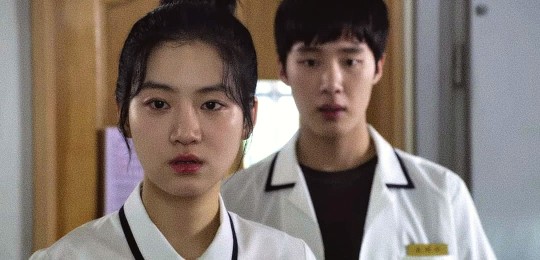
Oh Ji-soo and Bae Gyu-ri
“Love is the ultimate outlaw. It just won’t adhere to any rules. The most any of us can do is sign on as it’s accomplice.” - Tom Robbins
You know the story. You’ve heard it before, right?
Boy meets girl.
Girl finds out that boy is running a side protection business for prostitutes.
Girl decides to blackmail boy into letting her join his business.
Classic high school criminal shenanigans ensue leading them into more dangerous situations where they are forced to make desperate decisions to stay alive.
Oh, and they fall in love along the way.
Oh? You haven’t heard this one before? Then let me introduce you to this delightful kdrama called Extracurricular.
I watched this one while waiting for the newest Hometown Cha Cha Cha episodes to drop and ended up binging the whole series in two days. There are many remarkable parts of this series: it’s a crime drama, first and foremost, that showcases high school teenagers caught in a cycle of violence and crime, abandoned by the society and adults that are supposed to be protecting them. There are no clear good guys and bad guys in this drama; everyone is cast in shades of grey. Our main leads, Oh Ji-soo and Bae Gyu-ri, run the prostitution business, and are both from broken family backgrounds. Their actions are morally questionable at best, but the top tier performances from Kim Dong Hee (you might remember him from Itaewon Class) and Park Ju Hyun make you cheer for them anyway. You want them to have a happy ending, despite the horrible things they do. The audience is always reminded that despite how clever they are in staying ahead, their actions have consequences, and they’re just high school kids. The drama never pulls it punches.
But, weirdly enough, it’s also a love story. And that’s the part the really sticks with me until now. (The chemistry between the main leads is absolute dynamite and I could watch ten episodes of them just verbally sparring with each other. They don’t even kiss. They’re that fantastic when together on screen.)
I’m writing this because this is undoubtedly one of my all time favorite kdramas and I have a lot of feelings about our main pairing, Ji-soo and Gyu-ri. I can’t call them a couple (wait, didn’t I just say they fall in love) because their relationship can’t be labelled simply as that. Think of it as something similar to the main leads in My Ahjussi. Two people who should have become soulmates, yet met at the wrong time.
This kdrama is not particularly happy, and while I do encourage people to watch this, I am warning that the subject matter is extremely dark. If you’re sensitive to scenes depicting sexual assault, graphic violence, or anything in that zip code you’ll want to steer clear.
Also, I’ll be diving into spoiler territory in this analysis. So if you want to go in clean, then stop reading here.
Still here? Awesome. Let’s dive deep into the messy, amazing pairing that is Oh Ji-soo and Bae Gyu-ri. First, let’s do a brief character background on our two main leads, starting with Ji-soo.
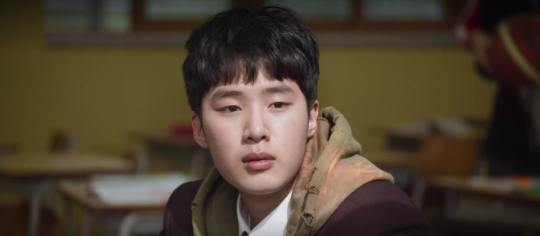
Oh Ji-soo is one half of our main pairing and this story starts with him. He lives by himself and has been essentially abandoned by his only parents; his father is a failed businessman who gambles whatever money he acquires on scams and his mother ran away. His apartment is small, sparse, but functional. He owns only a few outfits aside from his school uniform. The only unique item he owns is a pet hermit crab that he takes care of. His life outside of school is non-existent; he has no friends, no one to hang out with and do typical high school teenager activities with. He takes care of himself and lives only for himself and his “dream”: to graduate, attend college, get married, and have kids like a normal person.
But to do that, he needs a large amount of money. He has no other financial means to do so (his father is largely absent, as is his mother), so he decides, at some point, to start up this protection business for prostitutes. The drama doesn’t go into detail about the how and why he came to this conclusion that this was the best way to make a lot of money in a short amount of time, so you’ll have to suspend your disbelief from the get go. Considering the themes of the story (how youths abandoned by society tend to act out in extreme ways to make it in this world), it’s not hard to believe his desperation would drive him to make such a decision.
Ji-soo, despite his shady business, is actually a decent person. There’s a streak of humanity that exists inside him that refuses to go out, despite the increasingly dark and bleak events that start to overtake his life. He’s attached to his hermit crab, cares for his “employees” outside of them being tools to make him money, and doesn’t want to see anyone get hurt. He goes above and beyond what’s required to help out people at the risk of his own life (in particular, Gyu-ri, and we’ll get into that shortly).
What we learn from the first few episodes is that Oh Ji-soo is extremely smart and methodical in how he approaches his life. At school, he is known as a model student - quiet, top of the class in terms of grades, doesn’t draw any attention to himself, always follows along with what the teachers ask of him. Only his homeroom teacher, Mr. Cho, seems to consider his quiet style of existence to be concerning and tries to make him less socially awkward by pairing him up with another student in a new extracurricular club. This leads to the introduction of Bae Gyu-ri, Ji-soo’s longtime crush and future partner-in-crime.
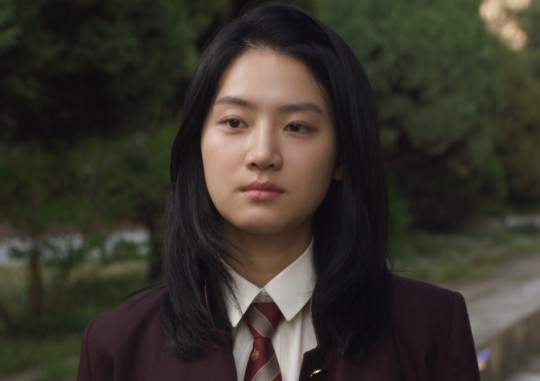
Meet Bae Gyu-ri, the other half of our dynamic duo. Her introduction into the story kickstarts the entire plot, as one of her earliest actions leads to a domino effect that spells increasing doom and tragedy for our main leads. She messes with Ji-soo’s operation at a critical moment and she spends the rest of the drama doing her best to make up for the consequences that follow.
In my personal opinion, she is probably the best main female lead I’ve ever seen in a kdrama. Hands down, no other character exists (currently) that rivals her sheer cunning, wit, and badassery. Gyu-ri is Crazy, capital C, and is the chaos to Ji-soo’s control; the fire to his ice. Despite being the direct cause of half the events that happen to Ji-soo in the drama, he can’t help but need her because of what she offers. They make an incredible team. Her competitiveness, her need to win no matter the odds, helps them survive time and time again.
Gyu-ri is from the opposite end of the spectrum of Ji-soo; he’s dirt poor and she’s insanely rich (always nice to see a reversal of typical kdrama tropes). Her mother and father run a successful entertainment company. Gyu-ri is popular at school, friends with seemingly everybody, pretty, cheerful and gets along well with her teachers. Ji-soo, and the audience, believe from the beginning that she has the perfect life. It’s not hard to believe that she’s just involving herself in Ji-soo’s business because she’s bored and needs an outlet, at first.
We soon learn otherwise. Gyu-ri has more in common with Ji-soo than he initially realizes, in that they’re both trapped in circumstances beyond their control - it’s just that Gyu-ri’s cage is gilded, whereas his is not. Her parents are strict and have her life planned out for her, all without her consent or input, leaving her feeling frustrated and powerless despite her rich lifestyle. A suicide attempt hasn’t done much to change her parents attitude towards her, only serving to further their control over her life.
So, when she learns of Ji-soo’s operation she immediately seeks to angle her way into it. First, she tries to rip him off, believing that he’s an evil “pimp” and thus deserves it. But after spending some time with him, she changes her mind last second and decides to help him out instead.
And, now, let’s get into their relationship, which is one of the best (if not the best) aspect in the entire series.

I need to be upfront about something: the relationship between Ji-soo and Gyu-ri is not exactly healthy. I wouldn’t describe it as toxic - the circumstances surrounding them aren’t exactly the best environment to encourage open and honest communication - but it’s definitely not what should be considered ideal, especially for young adults, and especially for young adults who are dabbling in crime instead of studying.
So, why do I love them so much? If you’ve read some of my previous posts, you know that I loathe toxic relationships in kdramas, so I understand if you think I’m coming off as hypocritical here. Why do I like Oh Ji-soo and Bae Gyu-ri when I didn’t like, for example from recent history, (oh boy, here I go again on my Nevertheless BS) Park Jae-eon and Yu Na-bi?
First, Ji-soo and Gyu-ri are way cooler than Jae-eon and Na-bi ever could be. They run a criminal enterprise that involves having a high amount of intelligence, cunning, and daring to do so. Do Jae-eon and Na-bi run a criminal enterprise as a side business? No, they don’t, because they’re boring art students.
Secondly, Ji-soo and Gyu-ri actually progress in their relationship and change their views as they learn from each other. Now, granted, that progress isn’t towards becoming better versions of each other - quite the opposite. But at least they have progress. Jae-eon and Na-bi stayed in the same stupid cycle for the whole series and then decided that it was better staying that way as opposed to trying for something else.
Last, but certainly not least, Ji-soo and Gyu-ri are actually interesting to watch for me. The chemistry between Park Ju Hyun and Kim Dong Hee is explosive and they way they spar, exchange looks, and just generally exist around each other on screen is something I can watch forever. I’ve said this before but Han So Hee and Song Kang’s on screen chemistry, outside of their intimate scenes, really didn’t impress me.
Okay, back to Extracurricular. This relationship, man. It’s all I can think about (other than HomeCha’s Du-sik and Hye-jin, but that’s another post). Ji-soo and Gyu-ri are so good together.
I’ve noted before that Ji-soo is methodical in how he approaches his life; he plans out everything ahead, and rigs any situation as much as he can in his favor. It’s brilliant, but when a crisis happens, he doesn’t know how to deal with it effectively. He panics and flounders; becomes indecisive at a time when clear, decisive action is required.
Enter Gyu-ri. She quickly becomes the partner he never knew he needed. When there’s a situation, she becomes invaluable in her quick thinking and wit, coming up with solutions on the fly. It’s not perfect, but it keeps them just one small step ahead of whatever is coming their way.
The only thing preventing them from becoming unstoppable is the lack of communication and trust they have with each other. A lot of that has to do with how Gyu-ri entered Ji-soo’s business - she blackmailed him first, and, when that failed, she strong armed her way into getting him to accept her help. It’s implied in the drama that Ji-soo has had a crush on Gyu-ri for a while (since ninth grade, I believe) and in the first episode he actually gets the chance to spend time with her outside of school on a sort of quasi-date.
It goes sideways pretty quickly because of some shenanigans from his business, but not before she gets to know him and says some pretty touching words regarding his situation. Poor guy is head over heels - even after finding out that she’s the one blackmailing him, his feelings are only dampened, not extinguished. When he catches a glimpse of her family’s situation, he gains a deeper understanding of her and why she acts the way she does. Even more importantly, Ji-soo treats her the same after finding out this information which, to someone like Gyu-ri, means more than if he comforted her about it.
If you want to see a physical representation of how he feels, other than paying attention to his actions, you can see it in him keeping mementos from Gyu-ri. She has an interesting habit of folding bags into origami shapes and giving it to him. Even after the blackmail reveal, you can see that he continues to keep these in a container on his desk. It’s really cute that he keeps these, when it probably doesn’t even matter that much to Gyu-ri.
Towards the end of the drama, Ji-soo prepares to turn himself in to prevent Gyu-ri from being implicated in the crimes they committed. And it costs him almost everything to protect her. Ji-soo, the quiet, nerdy kid, puts himself on the line time and time again to protect Gyu-ri, knowing that it puts his life and his dream at risk to do so. And all for what? For some girl that he thinks doesn’t even like him in return?
Well, let’s talk about that. Because I’ve seen some comments that Gyu-ri was only using Ji-soo for her own selfish gain. And I can agree that was how it was at the beginning for her; she definitely was only interested in acquiring money, like Ji-soo was, in order to achieve her own goal of being free from her parents.
But, oh man, that is not what is motivating her at the end.
It’s actually pointed out relatively early by some of her friends that it’s obvious that she likes Ji-soo more than he likes her. Understandably Ji-soo is keeping her at arms length from him given the whole recent blackmailing, so it would make sense that it looks that way.
Further questioning reveals what she likes the most about him:
“It’s not like I’m crazy about him. He’s fun. And amusing. He’s smart. And there’s a certain charm he has. He also has a wolfish side to him. But he thinks he’s a puppy.”
- Bae Gyu-ri
But, as she gets to know Ji-soo better, you can certainly see that she starts to fall hard for him. As a cover story for why they hang out so much together during and after school, Gyu-ri states to everyone that they’re dating. The reactions across the school definitely imply that this is a shocking development, which means that Gyu-ri hasn’t dated anyone before. So why Ji-soo other than the reasons she herself states?
He challenges her, just as she challenges him. Gyu-ri may be the more dynamic, quick thinking of the pair but Ji-soo is every inch her intellectual equal - just in different ways. She doesn’t seem to be the type to be easily impressed, but you can tell that she’s definitely impressed by Ji-soo’s operation and how thoroughly set up it is. When Ji-soo is frustrated at the beginning by his setbacks, he blows up at another student (knocks him out in a crazy punch) and immediately walks over to Gyu-ri afterwards (who saw the whole thing) to inform her that she is now his partner in crime.
The look in her eyes, and the small smirk she has speaks volumes about her attraction to him in that scene. Smoldering.
And, oh yes, she’s prone to jealousy. Another classmate, Min-hee, gives Ji-soo a present out of the blue (it was supposed to be for her boyfriend, Ki-tae, but that’s another sub-plot) - all within view of Gyu-ri. It’s hilarious how she tries to brush it off. Later, for plot reasons, Ji-soo has to spend more time with Min-hee which only furthers Gyu-ri’s annoyance.
And her motivations stop being entirely about the money and more towards helping preserve the dream that she and Ji-soo share about being free. There’s a scene in episode 8 where it’s revealed that, due to a business partnership with a local gang (set up by none other than Gyu-ri herself in a desperate move), Ji-soo would have to drop out of school permanently to work on their behalf. Gyu-ri overhears this and, despite badly needing the gang’s help in sustaining their own business, immediately terminates the partnership.
All because it would interfere with Ji-soo’s dream.
Man, if that isn’t love.
In the following episode, Gyu-ri, and later on Ji-soo, is kidnapped by the same gang in retaliation for terminating their partnership. Ji-soo comes to her rescue but Gyu-ri is already almost free (again, she’s really, really badass) and is demanding that they bring Ji-soo to her instead of running for her life.
Surviving this latest attempt puts the two in a reflective, vulnerable mood and Gyu-ri asks Ji-soo why he keeps saving her. Ji-soo asks later on why she keeps risking her life to be with him. They don’t say the answer in words but in an almost kiss (yeah, you read that right - almost).
And then, if you aren’t already convinced, Ji-soo crosses his one last remaining line in an effort to keep Gyu-ri safe; he accidentally pushes a fellow classmate down some steps and, instead of helping her, leaves her to die after grabbing the evidence she has on him and Gyu-ri.
Extracurricular pulls off quite the magic trick here, hiding this well done love story in the middle of a serious crime drama.
The real tragedy is that Ji-soo thinks that Gyu-ri views this whole business, and by extension his life, as one big game. It’s something that she takes offense at, visibly becoming upset when he says that.
But even if that were true, he should be assured since Gyu-ri doesn’t like to lose.
As they hurtle towards the end and face up to the consequences of their actions, Ji-soo and Gyu-ri undoubtedly lose sight of their original goals and dreams. They do some fairly horrible things to stay alive and ahead of the police who are close on their trail. You can’t really blame them for doing what they did; in the face of a society that has abandoned them, what they’re doing is a logical outcome to gain what they want so desperately and deserve so much: the chance to be free to live like normal, care-free people.
I can’t say for certain that they achieve that. The drama is serious in consequences and, at the end, the net around them is drawing tighter and tighter. I won’t spoil the ending scene for you, because I highly encourage you watch this drama yourself but I will say this: Ji-soo and Gyu-ri seem stuck in an impossible situation with nowhere to go, and no one to help them, with a clock ticking down towards either death or discovery by the police.
But, all the same, I’m always the optimist. They’ve gotten through situations like this before and they can certainly do so again. Maybe not as bad as this one, but not too far out of their league. And, like I mentioned before, Gyu-ri doesn’t like to lose. Especially when it comes to Ji-soo.
Their relationship is truly dangerous, as Ji-soo himself notes. Them being together is the source of their problems; they’re too much alike now, as opposed to the beginning of the drama where he stated that they’re too different. Their love is the kind of love where both of them are willing to burn the whole world down if it means keeping each other safe.
I’m a real sucker for those kind of love stories. No one’s a hero here. They’re just kids in high school, doing the best with what they know.
Who are we to judge what is right and wrong? Especially when the one committing the acts are high school kids who don’t know any better and just want to save each other?
Do we have that right?
Do they really deserve that punishment? Shouldn’t we be pointing fingers at the society that forced them to act this way?
Extracurricular really makes you think about that. Is it really so outlandish and terrible what Ji-soo and Gyu-ri do to survive when the adults who are supposed to be protecting them, teaching them better, have failed in their duty?
Maybe they really did win at the end. Not so much in succeeding in their goals but in gaining something that not even regular people are likely to find - a partner, a soulmate, someone who will stand by you no matter what.
If you do watch the ending, and are not an optimist like I am, then all I can say is this: whatever happened, they were together at the end.
They were together.
#extracurricular netflix#human class#netflix#kdrama#oh jisoo#bae gyuri#park joo hyun#park ju hyun#kim dong hee
63 notes
·
View notes
Text
On Allegory, Imperfection, and Inadvertent Subversion: A small essay about Akimi Yoshida’s Banana Fish and Salinger’s “A Perfect Day For Bananafish”.
In the story of Banana Fish, Yoshida references Salinger’s short story “A Perfect Day For Bananafish” (which henceforth shall be addressed as “Perfect Day” simply for ease of reading) several different ways, both in-universe and out. It is exceedingly evident that the character of Ash Lynx is heavily based on Seymour Glass, and one might surmise that Banana Fish is an allegorical retelling of “Perfect Day”, especially given that in the original story, Ash Lynx dies of what is arguably a “passive suicide” – that is, when faced with an injury that isn’t immediately fatal, he chooses to bleed out rather than seek help, which when framed as a suicide, parallels the much more violent and sudden suicide of Seymour Glass.
However, this surface-level allegorical reading ignores a very important variable in the story of Banana Fish, namely the counterpart to Ash’s Seymour: Eiji’s Sybil. While Ash and Seymour share many similarities (both are traumatized, troubled geniuses with partly-Irish roots who grew up in New York City), the similarities between Eiji and Sybil are very few. Eiji does symbolize a world of innocence to contrast with Ash’s world of horrors, but unlike Sybil, Eiji is an adult with agency of his own, and though he retains some of Sybil’s childlike innocence and is able to connect deeply with Ash as a result of it, Eiji’s agency and decisions ultimately change the narrative and its meaning.
That is to say, by introducing Eiji as an imperfect Sybil, one who has agency and can actually provide Ash with understanding and support of the kind that Seymour never got from Muriel or others around him (and which Sybil, being three years old, was in no way equipped to provide), Banana Fish directly subverts “Perfect Day”’s original message of cynicism in the face of a material world unconcerned with the horror of lost innocence and its resulting isolation.
To understand what this means, it’s important to first understand the meaning and context of “Perfect Day” and the circumstances in which it was written. “Perfect Day” is a story written first and foremost as a critique of American materialism in the wake of WWII; Salinger echoes the concerns of the Lost Generation before him, in a way, by really driving home the alienation from modern adult life felt by those who were exposed to the horrors and traumas of the battlefields in wartorn Europe, only to return home and find a culture completely removed from it all. Seymour Glass is a stand-in for Salinger himself—Kenneth Slawenski, in his 2010 biography of Salinger, notes that on returning from the European theater, Salinger “found it impossible to fit into a society that ignored the truth that he now knew.”
If that sounds familiar, good, because it should! This is precisely the motif of “Perfect Day” (as well as some of Salinger’s other work featuring members of the Glass family, such as Seymour’s younger brother Buddy, which, as an aside, is a name that might stick out to Banana Fish fans. Whether this is an intentional reference or a coincidence, I can’t say for certain, but given the depth of other references within this allegory, I’m inclined to think it’s intentional).
As a quick summary for those who may need a refresher, “Perfect Day” is a story about a deeply traumatized man who feels isolated from the rest of society because of the weight of the horrors he has been exposed to. Muriel Glass, Seymour’s wife, is the epitome of this: she represents the materialistic culture that Seymour feels so alienated from, always talking about brand-name things and luxuries and upward mobility. Seymour rejects her company in favor of playing the piano for children and spending time on the beach, where he tells three-year-old Sybil Carpenter a story about bananafish, fish that gorge themselves on bananas in holes under the sea until they’re too fat to escape the entrances to these little banana dens, and then they die. Instead of dismissing this story as something bizarre, Sybil claims she sees a bananafish in the water, which endears her to Seymour, until she leaves, at which point he returns to his hotel room and shoots himself in the head.
In “Perfect Day”, this interaction (between Sybil and Seymour) is the center of a set of dualities. Sybil represents the state of childlike innocence that Seymour longs to return to, and because of her innocence, she can “understand” him in ways that the material adults like her mother or Muriel do not. Seymour’s isolation is a product of his society and the lack of support and understanding for traumatized veterans returning from war, and it shows in the way that adults his age cannot connect with him, and he cannot connect with them. This disconnect between worlds is what eventually results in Seymour’s suicide—he can fit neither in the world in which he wishes to be, nor in the one in which he must reside, and it ends in his death.
The question is, then, how does this relate to Banana Fish?
As mentioned previously, Ash Lynx is a very clear parallel to Seymour Glass. He’s a young man faced with immeasurable trauma from which he believes he can never recover, and there is a clear motif of duality in his entire character arc: his world (one of violence and trauma) versus the “normal” world (where innocent people who have “regular” lives may reside). Like Seymour, Ash feels trapped in a world he can’t escape, knowing “the truth” that he knows, about the horrors that people are capable of.
It follows, then, that Eiji Okumura is a parallel to Sybil Carpenter, who represents childlike innocence and a world that Ash longs to be part of but can’t reach. And to an extent, this is true: Eiji is sheltered and innocent, comparing real-life to TV shows and being completely unexposed to kidnappings, drugs, guns, and violence. However, there is a sharp contrast between Eiji and Sybil, one that fundamentally changes the relationship between Eiji and Ash and makes it radically different from that between Sybil and Seymour:
Eiji is an adult, and as such, he has agency of his own.
Unlike Sybil with Seymour, Eiji can make his own choices and face Ash as an equal. Where Sybil is a child who runs back to her mother after playing with Seymour at the beach, Eiji actively and consistently chooses to stay with Ash, over and over. He even explicitly tells Ash “you are not alone”, which is a huge and direct contrast to the message of inevitable, devastating isolation from “Perfect Day”. Whereas Sybil’s innocence serves as a reminder to Seymour of what he’s lost and cannot regain, Eiji’s innocence is a beacon of comfort and companionship to Ash. Eiji is someone with whom Ash can relax and be playful like a boy his own age, as noted by Max and Ibe watching them interact.
This communication and connection are present between Sybil and Seymour, but in a very different way. Seymour prefers to play make-believe and tell silly stories to kids, because he went from being a wide-eyed innocent to being traumatized and longing for a place to belong, and Sybil as a child represents what he wishes he had, while the adults around him (most notably Muriel, his wife) are a world he doesn’t understand that feels false.
This is not the dichotomy of worlds that Ash faces. Ash faces a world of trauma and suffering that he sees himself as trapped in, and a world of peace and security that he thinks is beyond his reach. Where Seymour yearns for a return to innocence, Ash yearns to escape his pain, and the combination of this subtle difference with the effect of Eiji’s agency and the narrative structure of Banana Fish results in a subversion of the themes in “Perfect Day”.
Banana Fish is a long-form narrative, while “Perfect Day” is a short story. Part of the inherent structure of a long-form narrative is character growth and development, which for obvious reasons is much less prominent in short stories. As a result, Eiji’s impact on Ash is clearly visible over the course of the narrative, and it becomes impossible to declare that Ash is firmly rooted in the world he sees himself as trapped in. By the end of the story, even Ash wavers on this assertion; although he ultimately succumbs to suicide, a narrative choice that been criticized ever since its publication, in the moments leading up to his stabbing, he does believe that Eiji is right, or at least right enough that he wants to see him one last time (this is ambiguous and open to interpretation, of course).
Why did this narrative choice spark so much controversy and outcry from fans? Not every story that ends in tragedy is criticized as poorly written for it; examples range from Shakespearean tragedies to “Rogue One: A Star Wars Story”, a film in which the entire cast dies in the climax. Yet just about all fans agree that it fit the narrative. Clearly, then, it is possible to craft a story that ends in death and tragedy but still feels well-written. What makes Banana Fish different?
I would argue that the answer lies in this imperfect allegory. By creating a Sybil-esque character that can interact with the Seymour-esque character as equals, can stay with him, and can listen to him and support him through his grief and pain, Akimi Yoshida inadvertently turned “Perfect Day”’s message on its head. The tragedy of “Perfect Day” is Seymour’s isolation. By giving Ash a warm, compassionate relationship in which he is assured over and over that he is not alone, Yoshida upturns this entirely.
Ash is led to believe in this dichotomy mostly by his isolation. He believes that since Eiji is in mortal danger as a result of being special to him, he needs to send Eiji to safety, i.e. somewhere far from him and far from the reach of those who would hurt them both. This isn’t a miscommunication issue or anything of the sort; this is Ash being afraid for Eiji’s life; Eiji isn’t averse to returning to Japan itself. Eiji is averse to returning to Japan without Ash, as he mentions when he talks about how Ash could be a model, and tells him about kami. In establishing this as a consistent tenet of Eiji’s character, Yoshida ensures that Ash is not isolated in the same way that Seymour was.
In addition, Eiji can move freely between both worlds set up in Ash’s perceived dichotomy, a motif made explicitly clear when Eiji leaps the wall to freedom and light at the beginning, leaving Ash (and Skipper) behind in captivity in the dark. Despite this escape from the world of violence and crime, Eiji returns of his own volition and stays with Ash, experiences his own fair share of horrific traumas, and still leaves in the end to return to his world. This makes it clear that the dichotomy is less stark than Ash is led to believe, unlike the repeated validation of his isolation that Seymour receives, and is another reason that the ending of “Perfect Day” is inconsistent with the ending of Banana Fish
A quick sidebar: Banana Fish has no real Muriel, but if pressed, I would posit that the closest parallel to Muriel that exists is Blanca, whose main purpose in the narrative seems to be to reinforce to Ash that he can’t escape the world he feels trapped in and longs to leave. But where in “Perfect Day” Muriel symbolized the materialism of American society after WWII, Blanca has no real established reason to be so invested in keeping Ash down, and in conjunction with the fact that despite his own traumas, he can retire peacefully to the Caribbean, his role in the story falls to pieces entirely. Where Muriel represented a lifestyle that Seymour fundamentally could not reach, thereby reinforcing his isolation, Blanca is supposed to parallel Ash to a degree, but his words to Ash do not match his actions whatsoever.
Therefore, if anything, Blanca’s assertions serve only to strike a contrast with Eiji’s (and Max’s, to an extent, since Max and Eiji both agree that Ash can escape this and they want him to heal). Moreover, Blanca’s relationship with Ash is that of a mentor and a student, a relationship that is shown to be fundamentally unhealthy, given that Blanca willingly worked for Ash’s abuser, a mafia don who he knew trafficked children. Some argue that Blanca was blackmailed into this service, but given that Blanca chose to betray Golzine at the end and work with Ash with seemingly no real provocation or change in his relationship with Golzine, this supposition seems flawed. Blanca’s assertions about Ash and his ability to forge bonds and leave his world the way Eiji does, and indeed the way Blanca himself does, are simply incorrect, and the narrative itself provides us all the tools we need to realize that Blanca is wrong, even without the extended context of a parallel to Muriel Glass.
Returning to the main issue at hand, i.e. that of the imperfect allegorical connections between Sybil and Eiji, and the dichotomy between worlds that Ash perceives, it’s clear that in creating a positive, nurturing relationship between Ash and Eiji rather than a one-off encounter, Yoshida inadvertently created a story about connections rather than isolation. Ash’s attempts to keep Eiji safe from harm by sending him home are countered by Eiji’s assertion that he only wants to go to Japan if Ash comes with him, which is a kind of selfless devotion that reaches through Ash’s isolation until he decides that he won’t try and separate himself from Eiji anymore, which is a massive blow to the dichotomy of his supposed two worlds. This is the narrative acknowledging that both worlds can coexist.
Not only this, but also Eiji, who has his own trauma—he’s kidnapped several times, shot at, drugged, sexually assaulted, attacked with a knife by a drugged friend, exposed to several deaths, shot at people in fights himself, and ultimately nearly killed by a gunshot wound—despite all of this, Eiji is still allowed to exist in the world of peace and regularity. Eiji’s innocence is sharply tempered by traumatic experiences, and he can still walk between worlds. If Eiji, Max, Ibe, Jessica, Sing, Cain, and Blanca can all experience traumas, why is Ash the only one who cannot escape? Is there some kind of magical bar of “too much” trauma, like an event horizon on a black hole?
Obviously, no.
So it comes to this: Essentially, the reason that the ending is so controversial, and why I personally believe that the open ending of the anime is an improvement to the original story, is that the allegory between Banana Fish and “Perfect Day” falls apart because of Eiji’s agency. Ash wants to protect Eiji, and to protect Eiji’s innocence and light, because he feels that it’s beyond his own reach, but Eiji forges a bond with him that is rooted in mutual respect and care, and in doing so, undoes the devastating, painful isolation that led to Seymour’s suicide. This is why Ash’s death can feel so hollow—it doesn’t follow the pattern of “Perfect Day”; after the entire story is about Ash’s bonds and those who love him unconditionally, it feels almost like a shock-value plot twist tacked on, rather than a tragic inevitability.
I don’t believe that Yoshida intended Banana Fish to be a subversion of “Perfect Day”. I believe she meant it as a one-to-one allegory, and this is why she kept the ending as Ash choosing death. However, due to the changes in themes because of the characters and their relationships, Ash is not isolated in the profound way Seymour was, and his death is therefore not nearly as impactful.
#this is 2600 words i am so fucking sorry but also im not sorry im just verbose#banana fish#banana fish meta#asheiji#ash lynx#eiji okumura
279 notes
·
View notes
Text
The Whale Star Thoughts
Read the English translations / tried my best to understand the Korean of the manhwa The Whale Star / The Gyeongseong Mermaid (up to the most recently released chapter) and wanted to process it - spoilers under the cut.
First off, since only about the first 39 chapters or so are translated into English, my understanding of the events after that is much spottier, but I think I was able to follow the main character dynamics and plot points. I also didn’t know much about the Japanese occupation of Korea beforehand (and still don’t know a ton now beyond what’s touched on in the manhwa).
Regardless, I can say even without knowing Korean that the art is gorgeous with great colors, lighting, and details; the characters are fleshed out well and the women play prominent roles; and the motifs of the Little Mermaid, the ocean, being a fish are used beautifully and compellingly. For example, I loved how the water which Yoonhwa is that allows Soo-a to breathe is described to be living in is “poison” in ch 14 - I think referring to the patriarchy that resulted in Yoonhwa’s treatment and also how even someone from a high status, Japanese-pleasing family like her is still susceptible to the toxic impact of Japanese occupation.
Though to be honest, the main reason I’m writing is the process the character Haesoo, whom I didn’t think too much of initially but eventually became the most interesting character to me. He clearly has lived an extremely sad life and feels the effects of the trauma inflicted throughout the fight for Korean independence keenly. He’s a great foil to Eui-hyeon - arguably more morally gray, more viscerally/personally traumatized by violence - which I think results in the “fear” that Haesoo admits to feeling before their mission that Eui-hyeon does not. While Eui-hyeon teaches Soo-a how to read and write, Haesoo teaches her how to use a weapon. Soo-a seems to trust Eui-hyeon implicitly while having a very justified aversion to Haesoo, and she’s driven throughout the story by both her feelings for the former and her desire to get revenge against the latter.
And I can’t not mention how the Haesoo and Soo-a relationship is rich and complicated. While not entirely surprising, I did not expect Haesoo to develop feelings for Soo-a in the way he clearly does. Even though I started the story mostly invested in the development between Soo-a and Eui-hyeon, and it’s clearly the more mutual, healthier relationship and isn’t short of thematic richness, I ended up wishing for more interactions between Haesoo and Soo-a (even though I knew it was never going to be a thing and probably shouldn’t in the narrative).
Haesoo, of course, poisoned Soo-a, leaving her voiceless and traumatized. Soo-a understandably feels very on edge around him and tries to attack him when she sees him again for the first time. Haesoo also didn’t leave the experience without any scars, clearly feeling haunted himself for poisoning her even if he knows he would make the same decision again.
I like how a recurring theme in their relationship is Haesoo being ready to die and Soo-a forcing/urging him to live - stopping Haesoo from taking the poison, carrying his wounded body to the monk’s place, yelling at him when he says he wants to rest. “Why do people throw their lives away so easily?” Soo-a asks, and I think it’s a well-established part of her character that she values life - she expresses great sorrow over the dead whale and urges the doctor to help Eui-hyeon.
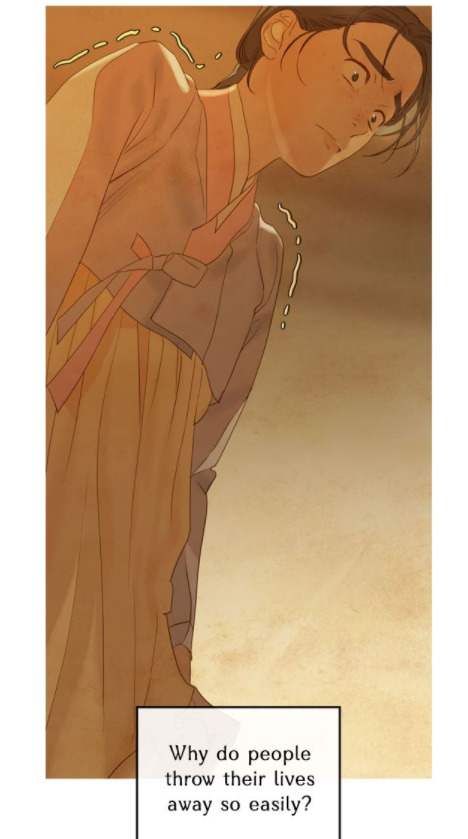
It’s significant and shows Haesoo’s growth that his last words to Soo-a are asking her to live.
Now, it is indeed hard to see them as a healthy, feasible couple without a lot of development in fanfiction land (and also without Eui-hyeon out of the picture in some way), but I think it could be fun to write about their dynamic, which is certainly less wholesome and sweet than Eui-hyeon and Soo-a’s is, but I think still with care and respect (for the most part aha).
I also find myself dwelling a lot on the monologue Haesoo has leading up to his death - especially the thought that Haesoo has about wondering about how he would have made the same choice if he had met Soo-a again in the same circumstance, and ultimately rejecting the idea of him owing his life to her like Eui-hyeon did in favor of the time in the mountain in the winter they shared together. (I think represented in the different fairy tales evoked for them - Little Mermaid vs Snow Maiden).
“If I could go back to the mountain where I spent the winter with you, that’d be good.”
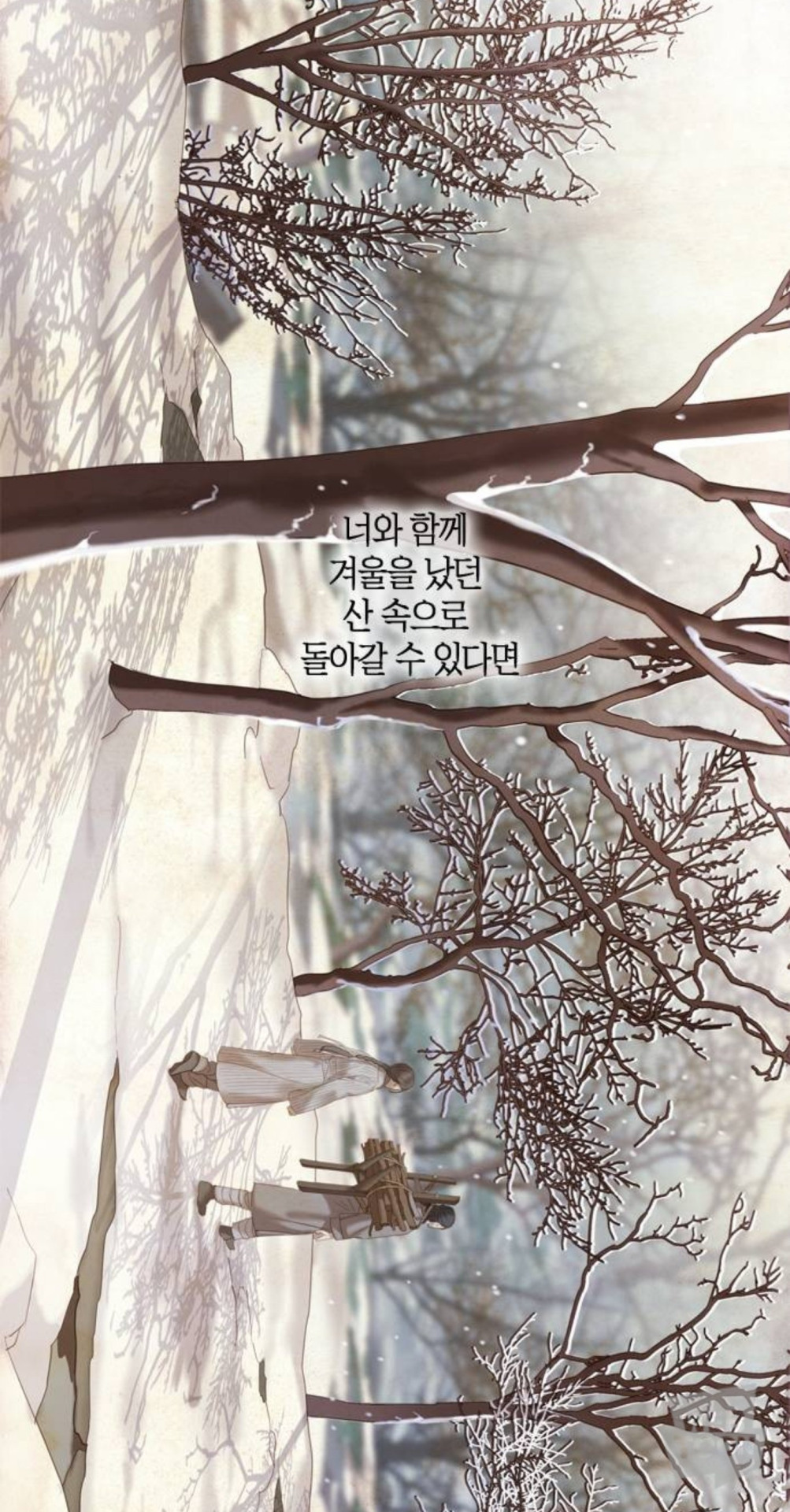
Part of me is just a sucker for any time a character wistfully says something like “I wish we could just go back to X time/location,” but I think it is also heartwarming that toward the end of his life, for someone who suffered so much tragedy and hardship and brushed with death on multiple occasions, he still ultimately really treasured his relationship with Soo-a and the brief period of time they were together.
I also find his final scene -- “waking up from a dream” in Yeonhaejoo with his brother Haeyoung and surrogate little sister Nokjoo beautifully tragic and fitting. I found it strange that we don’t see much of Haesoo mourning or generally thinking about Nokjoo after her death (unless there is more in the latter half of the series that I missed because of not understanding the Korean), especially compared to Soo-a who has known her for much less time. Of course, it’s clear he’s upset when she dies and he thinks of her when he breaks down in tears in front of Soo-a, but I wonder if part of his lack of thinking about it overtly can be explained by how much he acts toward her like he’s not secretly part of a dangerous Korean independence organization and tries to preserve her innocence as much as possible; i.e., he still mostly associates her with Yeonhaejoo.
In the end, his last line is about his dream being in Joseon, which obviously refers to the physical location where he spent his life after leaving Yeonhaejoo, but also I think could refer to Soo-a, who is often representative of Joseon as a whole.
73 notes
·
View notes
Text
Kazuichi, Byakuya, Gundham, Rantaro, Gonta, Leon, and Toko with an ultimate Broadway actress s/o
Desc; headcanons of kazuichi, byakuya, gundham, rantaro, gonta, leon, toko with an ultimate broadway actress s/o
Warnings; i tried to make this spoiler free, fem!reader, reader uses female pronouns, i guess this takes place at hope’s peak academy? pre-tragedy?? i dont really know about the v3 boys, haven’t finished the game lmao-
Gundham:
◊ He already knows a bunch about Musicals; especially the darker ones.
◊ He thinks your Ultimate is amazing, he loves all your plays.
◊ Neither of you know which between the two of you is more dramatic.
◊ Your dramatic personalities often intertwined, merging the two of you and making you both into one huge drama queen.
◊ It gives everyone a headache as you both scream, “My toe hurts!-” “My king’s toe hurts! Someone bring an ambulance, stat!”
◊ “Someone get the fucking chlorofoam-” “Hiyoko no-”
◊ This is a bad example, but you get my point-
◊ He enjoys Shakespeare and dark love story plays/musicals.
◊ So he would definitely enjoy acting one with you on stage, if you let him.
◊ He’ll somehow incorporate his Dark Devas into the play just for an excuse to bring them with him on-stage.
◊ Once he was playing Romeo and abandoned Juliet to save Cham-P after he ran offstage to eat a sunflower seed someone dropped on the floor.
◊ Fuck Juliet, mans knows his priorities.
◊ He’s kind of a musical theatre nerd, he enjoys discussing the message behind musicals you’ve played.
◊ Throwing in some compliments about how well you perceived the character, and how pretty you looked.
◊ He is always extremely proud and amazed at your ability to sing, dance and act so well all at the same time.
◊ He believes you don’t get enough credit for doing what you do, so he makes sure you know how proud he is of you.
◊ He sometimes quotes Shakespeare or some other dark musical while you two hung out, it was kinda cute seeing him geek out like that.
◊ “As said in ‘The Merry Wives of Windsor’, Better three hours too soon than a minute too late." Gundham quoted, pride laced in his words as he was proud of remembering that. “Gundham... it’s literally 5 am in the morning, the party starts at 12 pm. Go back to sleep.” Gundham blinks and nearly falls asleep where he stood. “Mmkay.”
◊ If he saw you dress up as the witch in Wicked, he would be whipped.
◊ His evil queen? In an evil costume? A dream come true!
◊ He thinks you look absolutely fabulous and praises you a bunch after the show, telling you how pretty you looked while you acted.
Kazuichi
◊ He wouldn’t know much about musical theatre, since he’s more into machines.
◊ But when you told him to come to a play you were going to star in, he jumped at the offer.
◊ 90 minutes of you? He must be the luckiest guy in the world!(Nagito would be proud)
◊ After watching his first play, he decides he is obsessed with musical theatre now, going to all your shows.
◊ He loves all the romance based musicals, he’s a sucker for romance what can he say?
◊ He’d obsess over all your plays, going into a lot of detail about his favourtite parts.
◊ He’s kinda like, your #1 fan.
◊ He has posters of musicals you’ve starred posted around his dorm room, just a bunch of merch of you and all the musicals you starred in.
◊ When you tell him he has a backstage pass because he’s your boyfriend, he is overjoyed.
◊ He actually trained a bit to be one of the backstage crew members.
◊ He learned how to fix your make up during intermissions, fix a loose stitch on your costume, all that good stuff.
◊ Though every time he sees your face up close for make up, he goes speechless.
◊ He wonders every time, how the hell did he get someone like you?
◊ Though his hands are shaking from how nervous he was, he still managed to make you look absolutely amazing.
◊ He’d blast a bunch of musical soundtracks while he works on his machines, screwing on and unscrewing things with a bop.
◊ I can imagine Kazuichi jamming with you in the car. The car moving violently as you two bounced to the rhythm like mad men.
◊ I think he’d get pretty insecure if he saw you with a love interest, he would think that when you two shared a staged kiss or scene, that it was actually full of love and not fake
◊ But when you cheer him up and tell him how much you love him, he realizes he was being silly over nothing.
◊ After watching many many romance musicals, you notice he gets more romantic; most likely mimicking the love interests.
◊ He is still a bit insecure, but if he does more romantic things, you’ll love him right?
◊ You enjoy the silly grand gestures of love, but you try and assure him constantly that you don’t need any of it.
◊ You only need him <3
Rantaro:
◊ w o a h
◊ He’d love the fact that you’re an actress
◊ He thinks it’s so cool like-
◊ constant fanboying after shows
◊ He’s always bringing you flowers once you’re off the stage, showering you with praises and affections
◊ He’s literally so proud of you wtf??
◊ i think he’d be the type to show you off a lot
◊ “Hey you!” He points at a naked passerby(this is an inside joke, i am so sorry), “Guess what? My girlfriend’s a Broadway actress!” “Rantaro stop, people are staring-” “Are they? hEY YOU! YEAH, YOU STARING!! MY GIR-”
◊ if you ever started spitting out hamilton raps, he’d be the one beatboxing in the back ground for you.
◊ “Pshh, packow, psshh psshh, packow!” “How does a bastard, orphan, son of a-”
◊ you two would jam out to musical soundtracks in your dorm, dancing dramatically as you did.
◊ you two kinda become like a duo of musical theatre kids.
◊ if you stood on a table and started belting lyrics, he would hop on and join you
◊ unless it was a solo, he would never steal your thunder.
◊ if you ever felt a bit nervous before a big show, he would assure you that’d you’d do great and tell you how much he believed in you until you felt better.
◊ he’s your charger before and after a big show.
◊ if you felt exhausted from acting and dancing around the stage, he’s always there to give you what you need most.
◊ whether it’s water, food, flowers, or just him and his cuddles, he always has it ready for you.
◊ the most recent musical soundtrack that you’ve played will be stuck in his head.
◊ For example, if you recently played in Hairspray, ‘Mama, I’m a big girl now!’ will be stuck in his head until the next play he watches.
◊ you’d catch him humming it during everything he does,
◊ and it’s actually so fricking adorable.
◊ if you heard him sing a familiar tune, you would hum along with him.
◊ “Hmm, mmwhen I was, just a kid ♪”
◊ Your ears perked up at the familiar tune, slowly you turned around to face him.
◊ “♪....You never let me do just what the older kids did…♪” You joined in quietly, Rantaro whipped his head towards you, a rising smile on his face.
◊ “♪ But lose that laundry list of what you won't allow ♪,” His voice rose slowly in excitement, pointing at you with a big grin across his face.
◊ And at the same time, you both sang obnoxiously loud, as if it was rehearsed, “♪ 'Cause mama, I'm a big girl now! ♪” Running to each other with excitement,
◊ You let out a fit of giggles as Rantaro picked you up, “MY WIFE, PLEASE BE MY WIFE!”
◊ This is how you two met and you can’t tell me otherwise-
Gonta:
◊ Gonta wouldn’t know much about Broadway musicals- which to you, a broadway actress, was unacceptable!
◊ so you made it your mission to get him to watch as many musicals as he possibly can.
◊ You’d tell him to come to all your plays, him excitedly agreeing despite not knowing what a play is.
◊ You’d do extra good knowing that Gonta was in the crowd watching you, wanting to give him the best first experience with musicals.
◊ He’d applaud at the end of every scene, trying to show his support the best he can.
◊ for his first play he watches, he ends up clapping a bit too early.
◊ he cheered and applauded super loud when he saw you on stage, but stopped when he realized everyone was staring at him.
◊ Though it was a bit embarrassing for both you and him, you felt your heart flutter at how his first instinct was to clap for you when you walked in stage.
◊ You’d introduce him to various musicals, beauty and the beast being his favourite.
◊ He definitely starts to obsess over the more ‘gentlemanly’ characters.
◊ his first impressions of the beast were bad; Denying that old lady shelter? How ungentlemanly!!
◊ so when the dude got cursed, he cheered lmao
◊ but as he kept watching, he could see the beast wasn’t too bad.
◊ The beast had some flaws, but he obviously cared for belle, he thought.
◊ Oh but he hated Gaston, he really really hated him.
◊ If you acted with someone who played Gaston(and you as belle), he would have to hold back and not rip his face off every time Gaston said something idiotic or sexist.
◊ He had to keep reminding himself that, that Gaston wasn’t real(and thank god for that, real gaston would’ve been torn to shreds.)
◊ the dancing scene was his favourite part for sure.
◊ He’s sad he doesn’t get to play beast with you, but he still enjoys the scene nonetheless.
◊ something cute I can imagine him doing is surprising you by dressing up in a prince costume from the musical and asking you for a dance.
◊ It’s the cutest thing ever oml-
◊ It’s such a beautiful moment, you two just dancing together in a random room with no care in the world.
◊ Your arms wrapped his extravagant costume and his arms wrapped around your pj’s.
◊ He’s a bit shy to be so close to you, but he tries his best to be confident and as princely as he could so he pushes his anxiety aside.
◊ As his stomach fills with butterflies, he becomes slightly confused and concerned, ‘Did Gonta eat butterflies??’ He slightly panics-
◊ ‘Those poor butterflies!!’
◊ He’d watch a lot of videos on how to ballroom dance in advance for this moment.
◊ He’s actually not that bad!
◊ Well- as long as you dance with your feet on his, so he doesn’t crush your toes.
◊ If you ever did some beauty and the beast scenes for him, he would be so happy.
◊ He’d be even happier if you let him play the beast with you.
◊ He’d be smiling the entire time during a fight/sad/serious practice scene.
◊ *almost gets stabbed* “Haha oh no!”
◊ When you sing during one of the scenes, he kinda just-
◊ becomes a puddle of a gentleman.
◊ his heart melts and disintegrates(haha what) of love for you.
◊ he absolutely loves your voice, and would beg for you to sing him one of the soundtracks from beauty and the beast before bed.
◊ He’s really proud of all your plays, and is extremely happy that you–of all people–are his girlfriend.
Byakuya Togami
◊ In all honesty, he thinks your ultimate isn’t all that great.
◊ But as he watches one of your plays, his mind ultimately(see what i did there?) changes.
◊ He becomes impressed and dazzled from how passionate you look when you act, not noticing how you had him sitting on the edge of his seat.
◊ After watching you act, he literally cannot watch another play unless you are in it, finding it unworthy of his time and money.
◊^^this is before you two got together,
◊ you two got together after you found him in your crowd, applauding like the rest of them with the same bewildered expression on his face.
◊ You confronted him and he attempted to compliment your acting, but he accidentally let his feelings for you slip out instead, “I find you truly captivating- Wait no, I-I meant your plays. Your plays, they are truly captivating.” You watched in amusement as he stumbled with his words, eventually interrupting him with an, “Are you available right now?”
◊ So yeah, eventually you two get together, and good for Togami! Because now he doesn’t have to secretly applaud you as a fan, he can applaud you whenever and as your lover.
◊ After shows, he’d give you a single rose as a congrats or applause (so romantic!)
◊ If you ever decided to be chaotic and start belting out lyrics, he would just sigh and let you finish.
◊ Very rarely, you would catch him humming a small tune of a musical song you sang.
◊ But very very rarely. If you ever catch him and confront him about it, he will deny it completely.
◊ I think he’d probably like the more serious plays, he enjoys the meanings and emotions of them more than the sillier and playful ones.
◊ If he ever watched Mean Girls, he would start to slightly mimic Regina George.
◊ “Byakuya wha-” “Get in peasant, we’re going shopping.”
◊ It’d be lowkey hot when you hear him sass you like Regina George tho-
◊ He’d have more big dick energy after watching Mean Girls, emitting his dominance to everyone.
◊ Makoto during a class trial: “So we know that she was at the scene of the crime, right?” “Shut up.” Byakuya flipped his imaginary long hair as Makoto stares at him in confusion, silence filling the room. “Shut up!” “I didn’t even say anything-”
◊ “The new motive is going to be-!” “Whatever, I’m getting cheese fries a book.” Byakuya sighed, turning on his heels and catwalking away.
◊ ...
◊ “IT’S PUNISHMENT TIME-!” “MONOKUMA WAIT NO-”
Leon
◊ Would go to every one of your shows.
◊ Would act like an absolute mom in the crowd.
◊*holding a video camera* You’re doing great sweetie!.
◊”That’s my girl!”
◊ You’d get embarrassed every time he does that.
◊ Hypes you up when you get nervous before going on stage.
◊ In back stage, he’d praise you and give you a bouquet of flowers.
◊ Where did they come from? When did he have time to get flowers when he was yelling in the crowed??
◊ Helps you rehearse lines even if he has no idea what they’re about.
◊ Will fight anyone that makes mean comments towards you.
◊ Even if it’s just constructive criticism, he will take it as an insult.
◊ “Hey s/o! You did great! Maybe next time you could-”
◊ Leon: “WHAT DID YOU JUST SAY PUNK!? DO YOU KNOW WHO SHE IS?! I HAVE FRICKING ARMS OF STEEL, I WILL-”
◊ Will take every chance to pick you up and call you a queen.
◊ When you guys watch other plays together, he always says how you’d play a better role or that you’d do so much better.
◊ He is pretty jealous of your talent, he has always wanted to be a singer instead of a baseball star, but his ultimate wouldn’t allow that.
◊ So if you let him sing some musical song duets with you, his heart will be so full.
◊ You make him so happy, he almost breaks into cries.
◊ You two of weekly karoake nights, always singing some Heather’s duet together.
◊ One time, you, Sayaka and Leon sang the Candy Store song, Leon being Heather Chandler, Sayaka as Heather Duke, and you as Heather McNamara.
◊ It was... amazing.
◊ Everyone was cheering, clapping and it praising all of you.
◊ You made Leon feel alive, and he really, really loves you for that.
Toko
◊ She loves your ultimate, and fangirls over you a bunch.
◊ She’s amazed at your confidence to go up in stage, knowing she could never do that.
◊ She thinks your confidence is kinda hot, and decides she is in love.
◊ Likes to add a character in her books that are a lot like you, maybe making them a broadway actress-
◊ She thinks about you a lot, sometimes accidentally blurting out how pretty you were in your last performance in front of everybody.
◊ You confronted her for it, and she almost passed out.
◊ “W-w-why d-do you think t-t-that? D-d-do you th-think you’re b-better than m-me or so-something?”
◊ You already know her and her inferiority complex, so you don’t take offence to what she said, simply replying with, “I think you’re really cute.”
◊ Toko goes silent, except for a few “!??!??” noises that came out of her.
◊ “... U-uh, a-are you j-joking, be-because that isn’t f-funny!” She flushes, denying that you complimented her.
◊ “I’m not joking, here’s my number! Call me, kay?” You grinned before turning on your heel.
◊ She’s kinda dumbfounded, did her crush just ask her out??
◊ She denies it hard at first, not believing that you asked her out.
◊ Thus, not calling you.
◊ Well, I mean, she kinda did.
◊ She dialed your number one day, feeling a bit lonely.
◊ But as she heard your morning voice, she squeaked and hung up quickly.
◊ She felt her face turn into a fireball, her thoughts going into overdrive from how attractive your voice sounded.
◊ Your voice, she was attracted to your voice.
◊ The next day, when you ask her about what that call was about, she denies it and calls you stupid.
◊ Sprinting away while she screamed, “I-i-idiot!!”
◊ Acts like an absolute tsundere around you.
◊ You constantly flirt with her, trying to get her to accept a date with you.
◊ Being the dramatic hoe you are, you try and give her a declaration of your love.
◊ Knowing she is the Ultimate Writer, and into poems, you write one for her.
◊ You declared your love during one of your plays, knowing she sat in the crowd somewhere.
◊ You interrupted a scene and jumped off stage, “Toko Fukawa!”
◊ Her head perked up in surprise, eyes widening as she saw you on one knee for her.
◊ “W-what are you d-doing!?” She yelped, moving her legs away from you.
◊ “I am in love with you. Completely and utterly in love with you, everyday when I see you so immersed in writing a book, I believe I am looking at an angel.”
◊ The crowd stared at the both of you, gasps and aws filling the air.
◊ Toko flushed, you watched her while she wrote?
◊ “For every time you’ve told me I was a fool, an idiot, you weren’t wrong. Because I am a fool, a fool in love with you.” You had one had on your chest, looking into her eyes sincerely.
◊ Her eyes glossed over so slightly you couldn’t see, looking around at the crowd before uttering out, “Y-y-you r-really love m-me, h-huh?” Her face contorting into a lopsided smirk, watching as you giggled.
◊ You laughed out, “Absolutely.”
◊ WHY DID THIS TURN INTO A ONESHOT WHAT WHY WHAT WHYYY
note; thank you so much for reading and sorry for the wait!! we tried our best to finish these together, thank you so much for your patience.
#mod bread#mod chia#mod toby#danganronpa trigger happy havoc#super danganronpa 2#gonta gokuhara#danganronpa headcanons#gonta x reader#gonta headcanons#rantaro amami#rantaro x reader#rantaro headcanons#gundham x reader#gundham tanaka#gundham headcanons#kazuichi x reader#kazuichi souda#kazuichi headcanons#toko fukawa#toko x reader#toko headcanons#leon kuwata x reader#Leon headcanons#leon kuwata#byakuya togami#byakuya togami x reader#byakuya headcanons
325 notes
·
View notes
Text
The Voyage So Far: Whole Cake Island
east blue (1 | 2) || alabasta (1 | 2) || skypiea || water 7 || enies lobby || thriller bark || paramount war (1 | 2) || fishman island || punk hazard || dressrosa (1 | 2) || whole cake island || wano
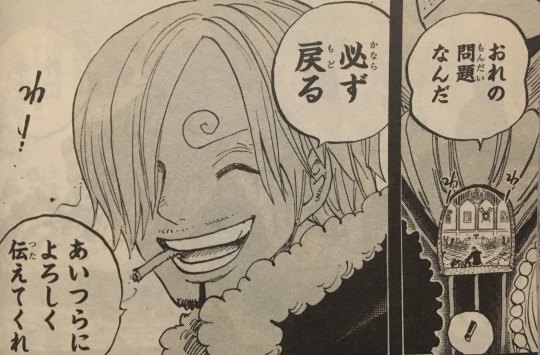
sanji is such a self-sacrificial idiot. and i know that’s not exactly a ground-breaking statement, but it does define the entire first half of whole cake island, so it may as well be reiterated here: sanji does not value his own life as much as he should, and fails to grasp that other people care about him outside of what he can offer them, which is why he’s so surprised when luffy later comes charging headlong into big mom’s territory.
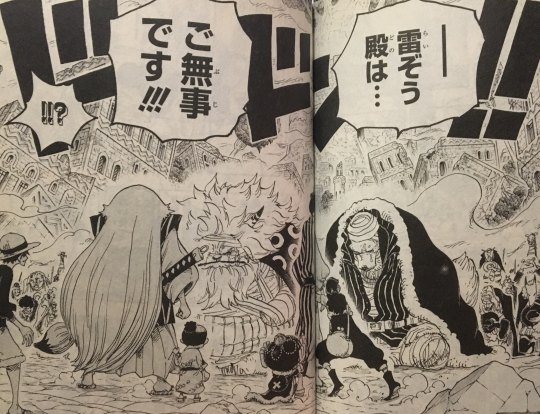
zou is a really good little arc, and it also mirrors the themes of whole cake island in miniature. the minks collectively make a massive sacrifice and risk absolutely everything to protect raizou, and wci is essentially all about loyalty and sacrifice, whether its sanji giving himself up to protect the strawhats and zeff or luffy and the strawhats facing impossible odds to rescue him to pedro giving up his life to get them all out of there safe.
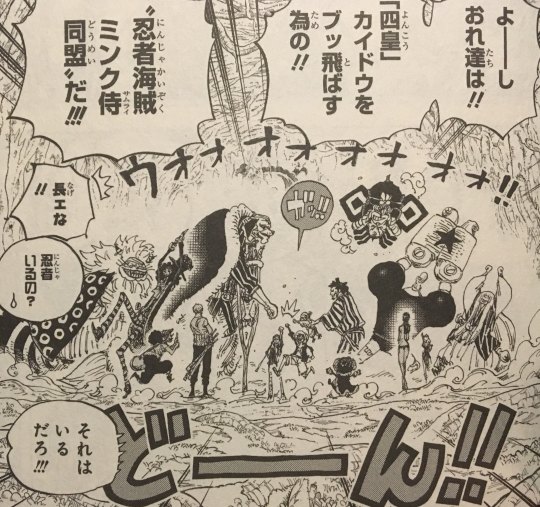
huge fan of this panel partly just because it’s cute and partly because it’s a great visualization of just how dysfunctional the heights are in one piece.
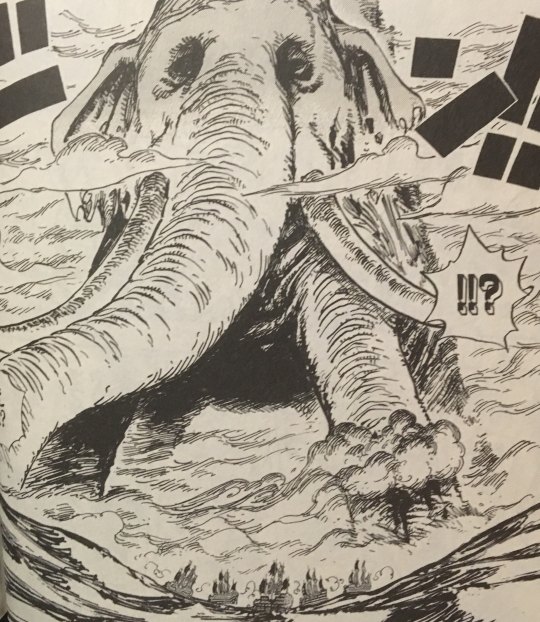
zou is one of my favorite settings in one piece just for the sheer creativity of it. zunesha is so massive and so mysterious and so strange. and she really looks unspeakably old just from how she’s drawn, looming over everyone and everything, eyes hollow and empty, an entire forest and an entire people growing on her back that have been there for thousands of years. it’s just so neat and so wildly inventive.
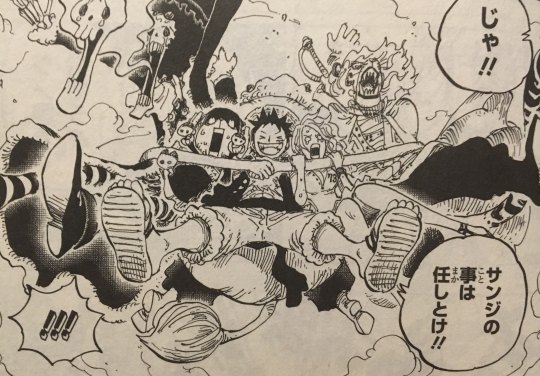
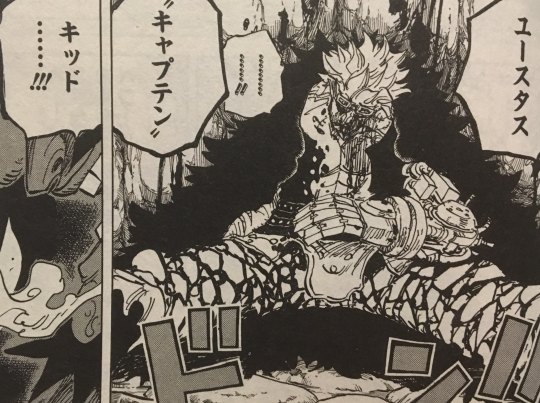
this applies to zou as a whole, but i think it’s really cool how all the little threads that will become important during wano are set up so effectively even before whole cake island starts. we get this shot here of kidd beat to shit and then forget it because so much happens between here and when he shows up again in wano, but then oda punks us into caring about him and killer so much and this retroactively becomes very important.
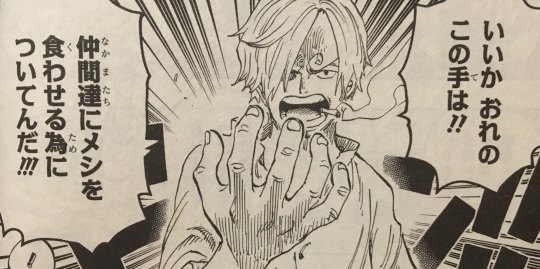
ever since his introduction sanji’s always been a character basically defined by his adherence to his principles: always feeding the hungry, never wasting food, never hurting women, never using his hands in combat. he’s probably the most firmly principled person on the crew, and that’s more obvious in whole cake island than in any other arc except maybe baratie.
sanji is very stubbornly good, which puts him in acute contrast to his siblings and their general cruel apathy. it’s something i really like about him.
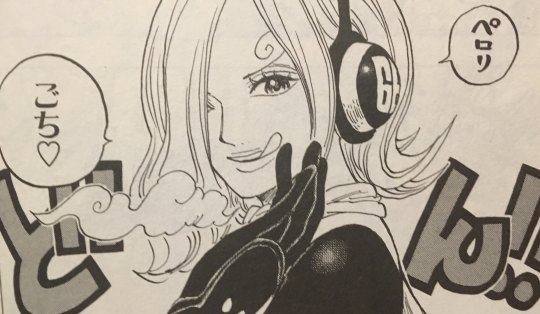
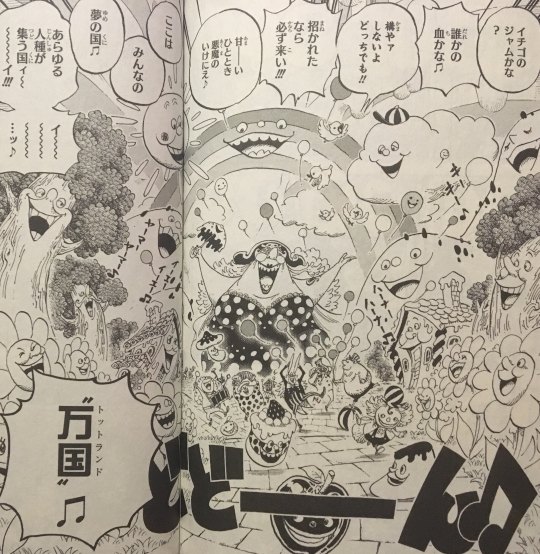
i’m a huge fan of big mom’s introduction, which is also our introduction to tottoland in general. it’s cutesy and colorful and musical while simultaneously being deeply creepy, with lyrics about killing people for ingredients and making jam out of blood, which is a great summary of the core of big mom’s character. she’s an old lady all in pink who lives in a cartoon fairy-tale land- but she’s also a deranged cannibal, and all those singing trees and flowers are animated by the life she steals from her citizens as tax.
whole cake island draws on a lot of fairy tale motifs (especially with brulee), and the contrast that saccharine appearance creates with how fucked up the actual content is is super effective and memorable, i think.
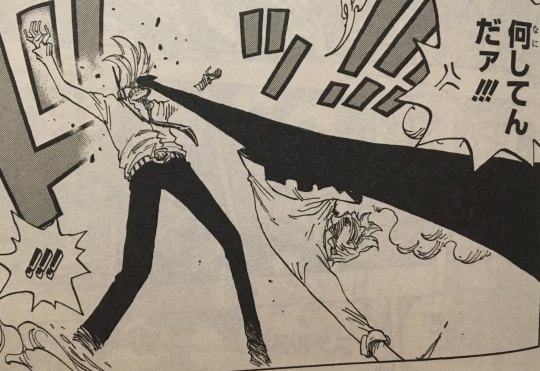
honestly i find most of the content of sanji with the vinsmokes just plain upsetting, which i’m sure is intentional, so i’m not going to go into it a lot here, but i am including this panel of him kicking niji in the face.
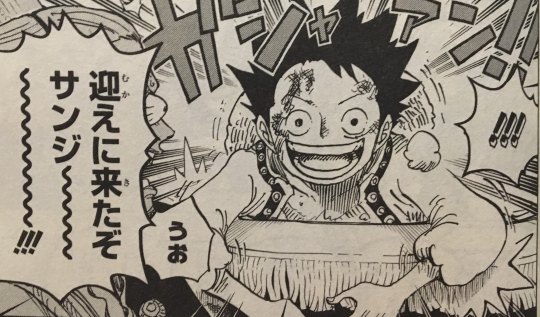
sad as this scene turns out, luffy’s absolute thrill at finding sanji and the corresponding bafflement of the vinsmokes as to how the fuck he even got there always kinda makes me grin.
i always love seeing people’s underestimations about luffy get thrown right the hell out the window- because let’s be honest, he’s easy to underestimate, he’s like a five and a half foot tall rubber teenager and not very physically intimidating and all, and then he goes and pulls off the impossible without blinking.
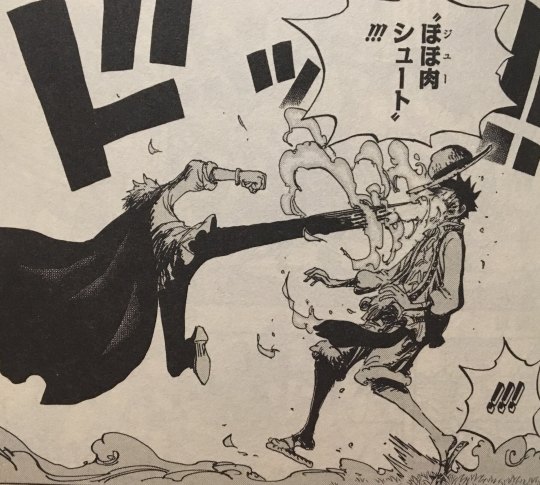
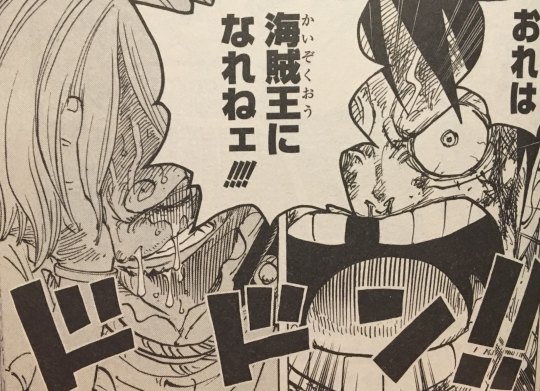
the thing that makes luffy unique as a captain has always been his willingness to rely on his crew, and his willingness to openly admit that reliance, like he did all the way back in arlong park. most of the other contenders for the pirate king’s crown we’ve seen- big mom, kaidou, crocodile once upon a time- have been stubbornly individualistic people who explicitly shown not to care for their crew and allies, generally seeing them as disposable.
luffy is the opposite of all of them, because his crew are everything to him, to the point of being willing to sacrifice his dream for them. and the loyalty he wins from them in return is unmatched, as opposed to big mom and kaidou, who both get cheerfully betrayed not just by their own crewmates but by their own children.
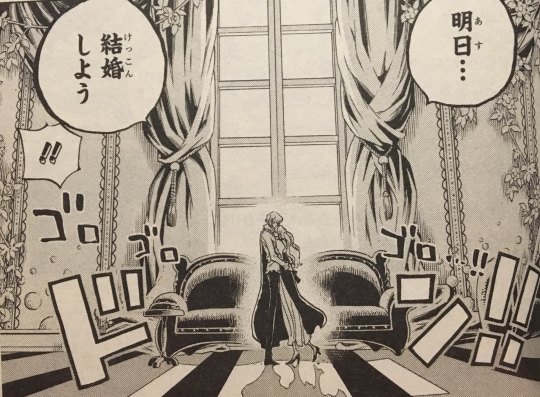
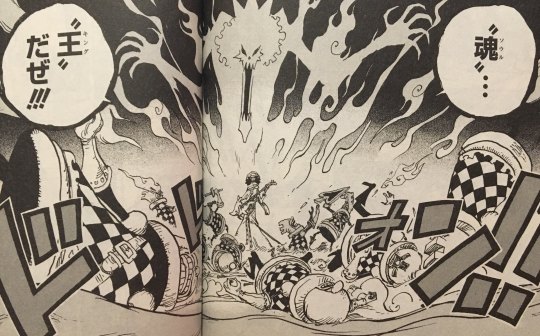
brook is really cool in whole cake island, and honestly it comes at just the right time for him as a character. ever since his introductory arc in thriller bark until this point he hasn’t gotten a ton of focus, so it’s great that he gets to be the mvp here and demonstrate exactly why he’s a strawhat pirate and how much he’s grown over the timeskip.
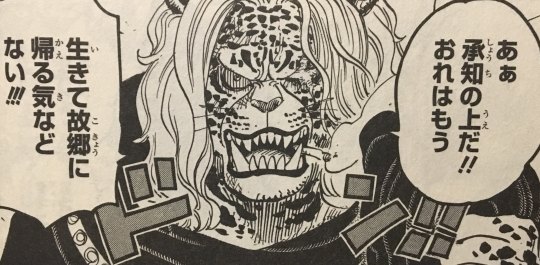
oda is generally really good at introducing and handling characters contained to a single arc/saga, but i do think he absolutely knocked it out of the park with pedro. he has an interesting backstory, compelling motivations, and basically an entire sub-arc ending in his death that never distracts from the main plot, but only ever adds to it.
pedro really feels like a fully realized character who’s had a whole life offscreen, who we just happened to catch at the very end of his story. i think that’s super impressive.
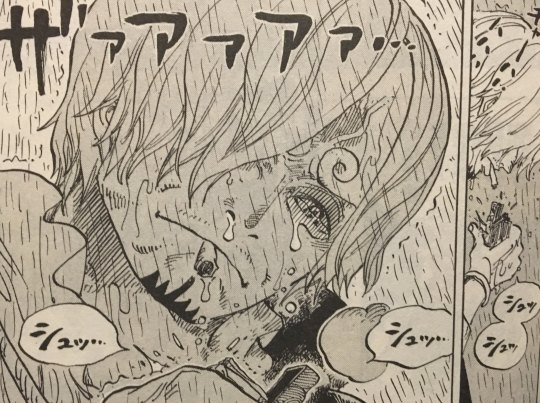
i really love this moment, because for me, this is the moment where whole cake island becomes a tremendous arc, and where the tides begin to turn and the dominoes begin to fall, one after the other. this is sanji hitting absolute rock bottom. the one ray of light he pinned all his hopes on was a lie, and he can’t even light a fucking cigarette.
but one piece is, very often, a story about picking yourself up even when you feel like you can’t.
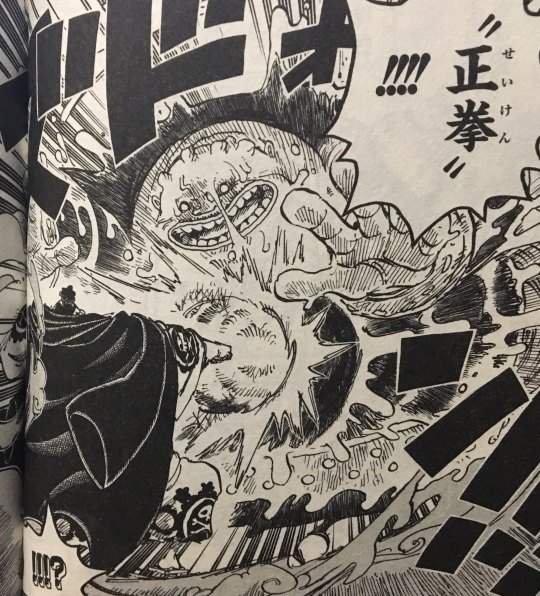
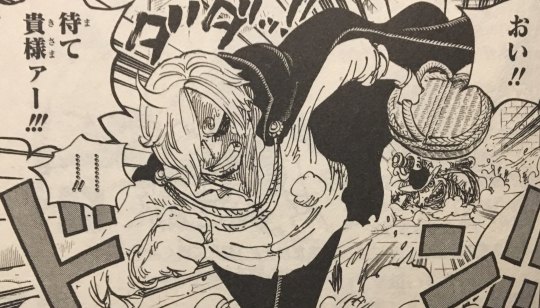
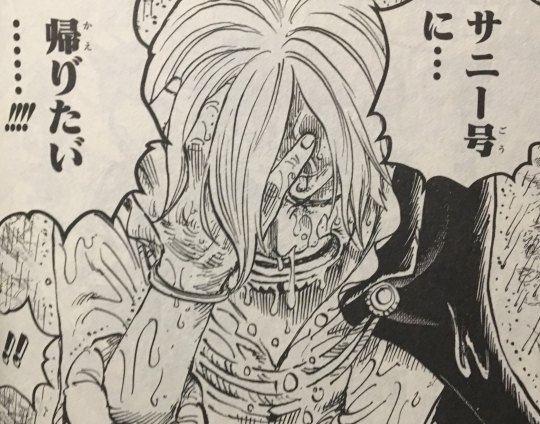
i think there’s something lovely about how much one piece emphasizes the value of honestly asking for help. luffy waits for nami to ask for help, and for robin to say she wants to live, and for sanji to admit he just wants to go home, and then says, “okay, i’ll make that happen.”
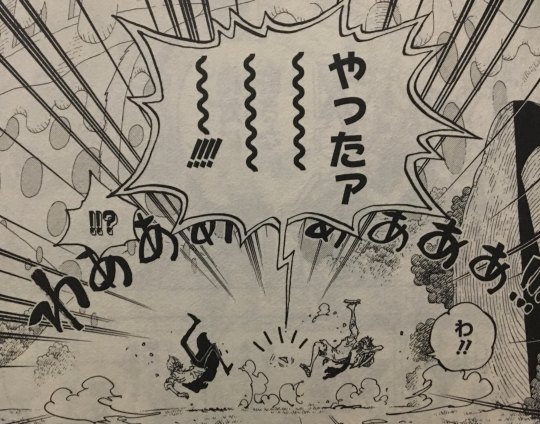
it just makes me so happy how happy the stawhats are to know sanji’s back with them. it reminds me a lot of how they all brush off robin’s thanks after enies lobby. sure, they’re going to have to crash the wedding and confront big mom directly and might all die, but who cares? they’ve got sanji back. i’ve said it before and i’ll say it again, i love how much they love each other.
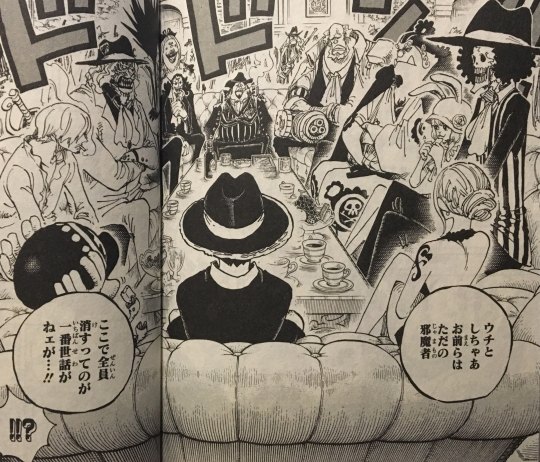
i think the gangster outfits are super fun, and i love that oda is committed enough to his aesthetics to come up with an excuse to put them all in formalwear. it pays off, they all look extremely snappy.
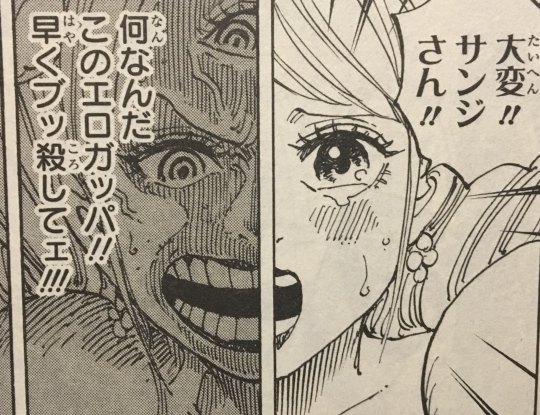
i know i just said it in the dressrosa posts but i’m reiterating it here because this is my favorite example of it by far: i love when oda does this split-screen thing with his panels. the contrast between the two halves of pudding is so severe and yet they’re so clearly the same person i honestly just find this pair of panels fascinating to look at.
this panel also kind of gets at my favorite thing about pudding as a character, really. i know she’s a little controversial in fandom, but i’ve always found her entertaining (at least post-reveal), especially in the contrast between her unhinged evil side and her genuinely sweet romantic side and her post-wedding tendency to randomly ping-pong between the two.
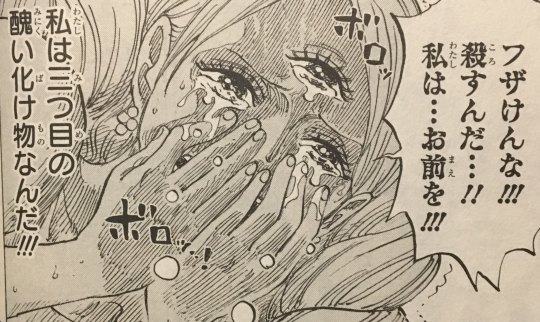
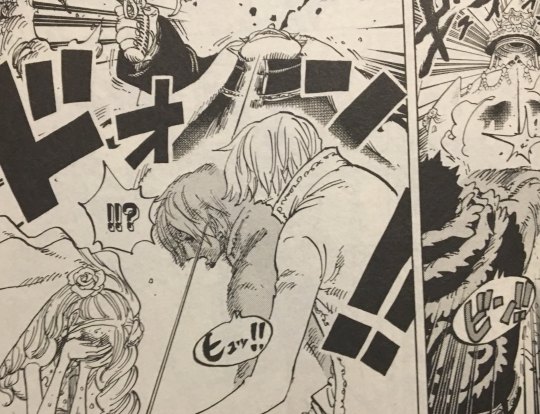
i just always like reminding people that sanji is fast enough and his observation haki good enough to dodge a surprise attack, while thoroughly distracted, from katakuri.
sanji in this arc tends to get shit from a certain side of fandom for being ‘useless’ since he doesn’t have a big climactic fight despite being the focus of the arc, which i think is thoroughly missing the point. sanji is still plenty capable in combat, as demonstrated both here and later, with chiffon and oven. it just happens that his strength isn’t what saves the day ultimately, because combat ability isn’t everything, which is the entire point of the vinsmoke backstory/subplot. sanji saves the day just by being kind.
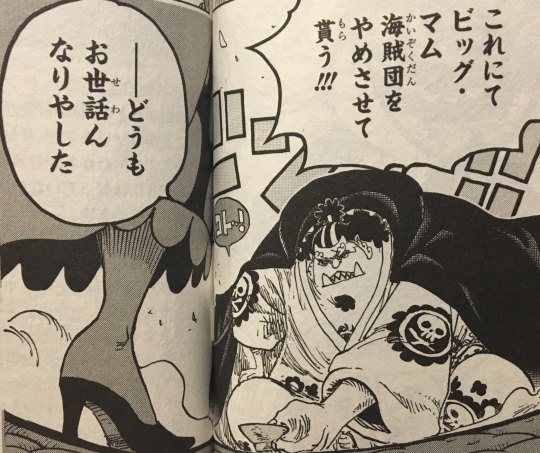
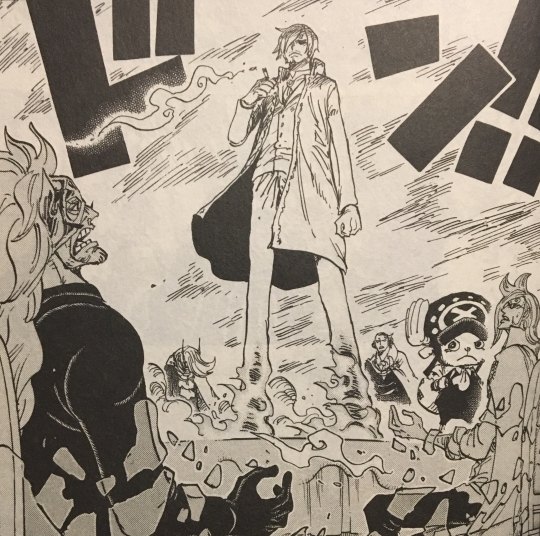
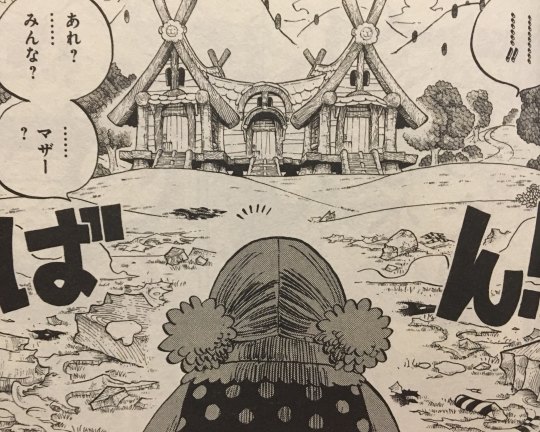
i’ll admit big mom’s flashback isn’t one of my favorites, taken in isolation- there are some parts of it that kind of unresolved (at least as of now- i still suspect they’ll be followed up eventually), and in general, although there is a tragedy to it, it doesn’t quite hit the way many of the other more effective flashbacks do. that said, i do think it does a really good job of succinctly explaining why big mom is the way she is in the present: she’s a child who was never told no, who never grew or matured past the disappearance of her adopted mother. that’s it, and that’s enough.
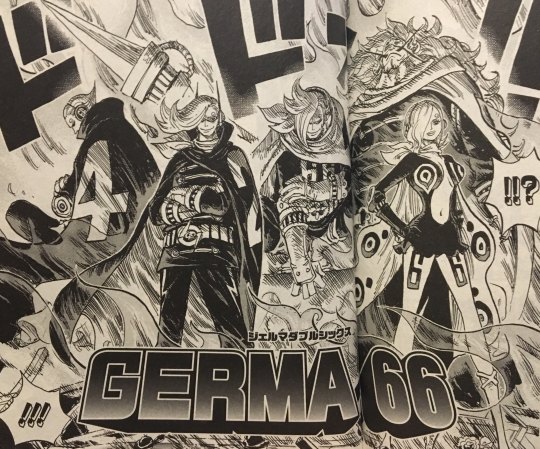
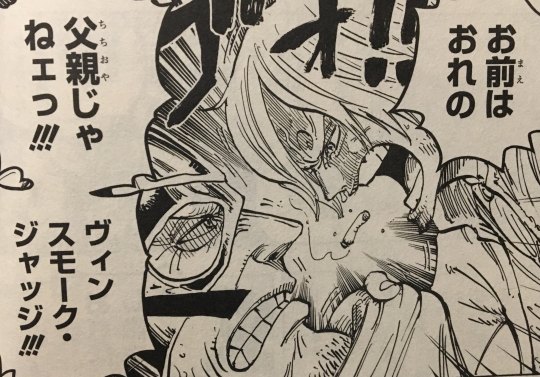
i’ve always been a little bit in love with how seriously and consistently one piece handles its themes of found family, and sanji outright disowning judge in whole cake island is maybe the most outright they ever get: family is found, not made. you owe nothing to your blood and are never beholden to your abusers.
and i just like that a whole lot.
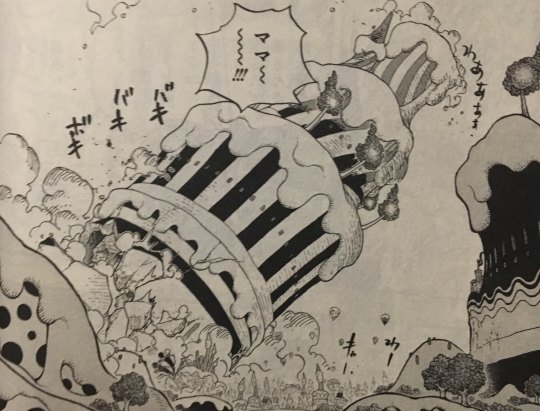
i do think the tamatebako is one of the best uses of chekov’s gun i’ve ever seen. we’re first shown it at the end of fishman island, it’s revealed it got sent off to big mom rigged with explosives which is a minor “oh fuck” moment, and then it gets forgotten about, because the entirety of punk hazard and dressrosa happens in between! which is a lot!
i remember when i reached the moment in whole cake island where we’re reminded that that bomb still exists and is still waiting to explode, i just started laughing hysterically out loud, because i’d completely forgotten, and now that i remembered i was just delighted to know it was going to definitely go off at some point, almost certainly in a very satisfying way.
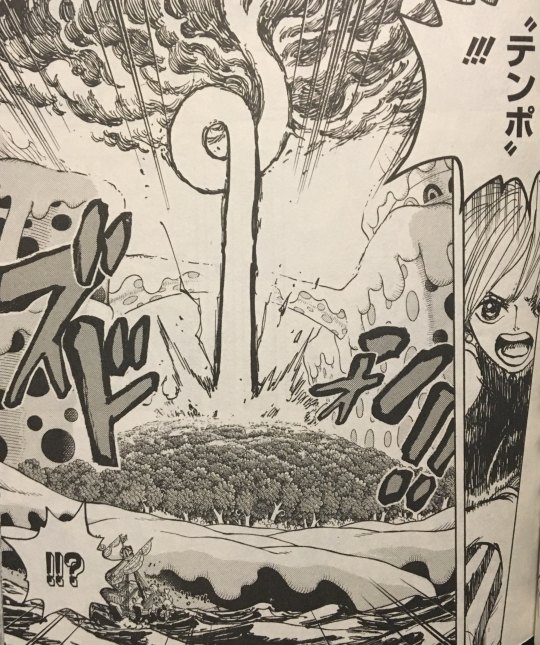
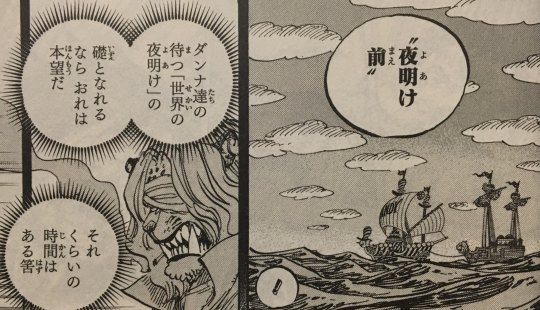
pedro is, if i remember right, the first time the imagery of the coming dawn that will become quite important in wano really has attention drawn to it in-text- the recurring motif is there before this, of course, dating all the way back to the names of the first chapter (romance dawn) and first island (dawn island), but this is the first time it’s actively addressed in-story.
in doing so, oda essentially presents a fresh mystery for us, but one that has been set up so consistently ever since chapter one that it feels like it fits perfectly into the world and story.
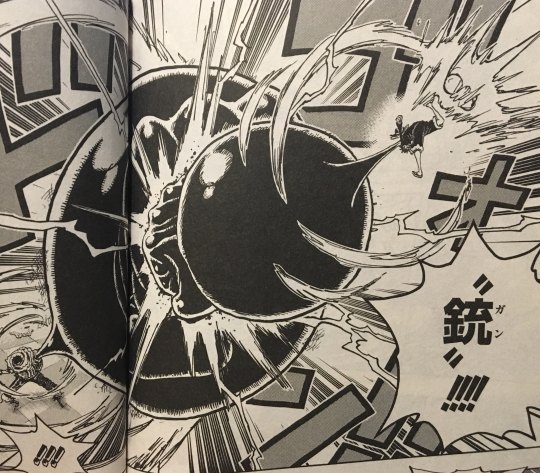
luffy’s been punching way above his weight class ever since crocodile all the way back in alabasta, fighting enemies who clearly outmatch him but always managing to win anyways, but his fight with katakuri is maybe the clearest the sheer differential in strength ever gets, because katakuri’s powers are similar enough to luffy’s that he can pull off pretty much all of luffy’s techniques, but better. so luffy has to fall back on the two things that have always been his greatest strengths, again all the way back to crocodile in alabasta: innovation and sheer fucking stubbornness.
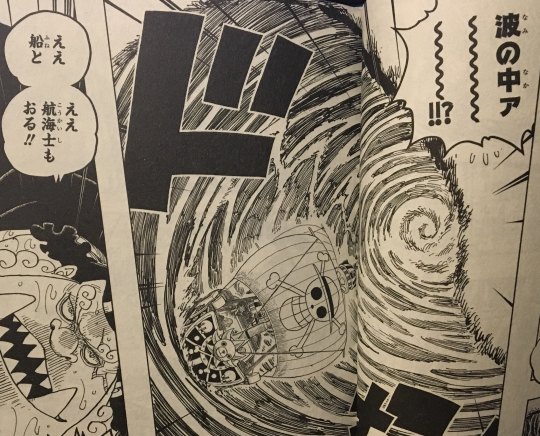
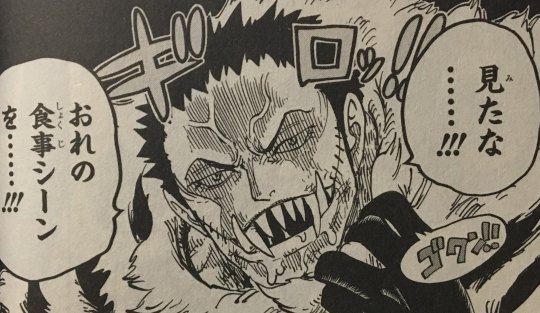
one thing i love about one piece is how no character is immune to being clowned on. absolutely nobody. everybody looks like an idiot sometimes, and it makes everything so much more fun than if the series took itself more seriously. katakuri basically actively tries to avert this by building up a fearsome, flawless, and utterly no-nonsense persona, but it winds up failing hard because it actually only makes the contrast and surprise of his actual personality and vices that much funnier.
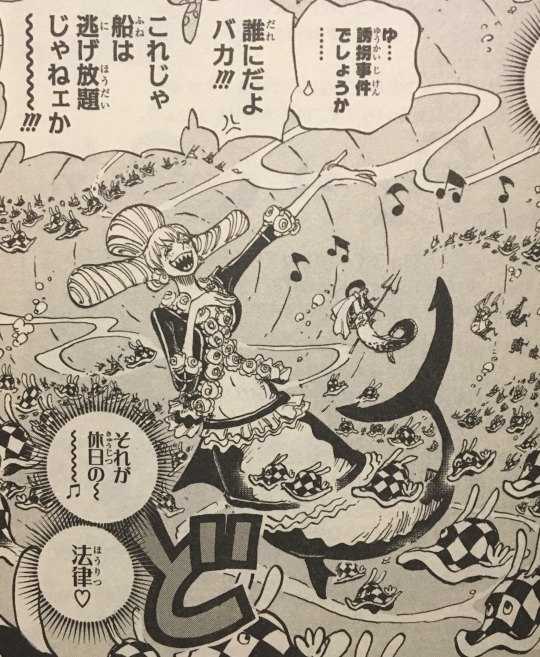
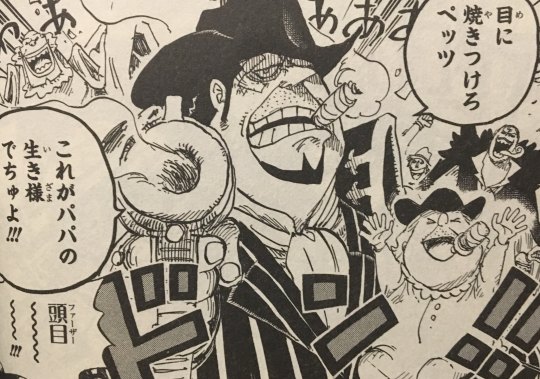
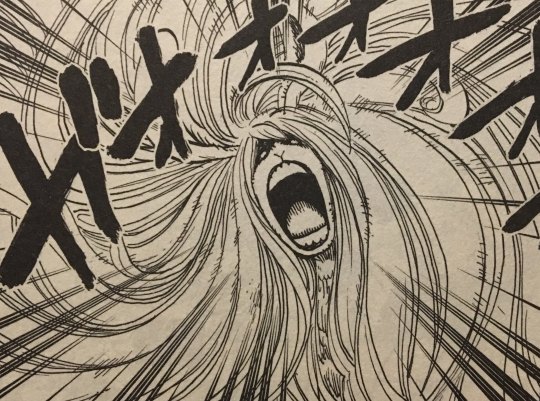
i’ve always loved this one panel of carrot going sulong, because she just looks so monstrous, like a true werewolf. the same goes for the shift in big mom’s design when she starts going truly mad with starvation and gets even more threatening-looking (below). i just think oda should let women be monstrously scary more often.
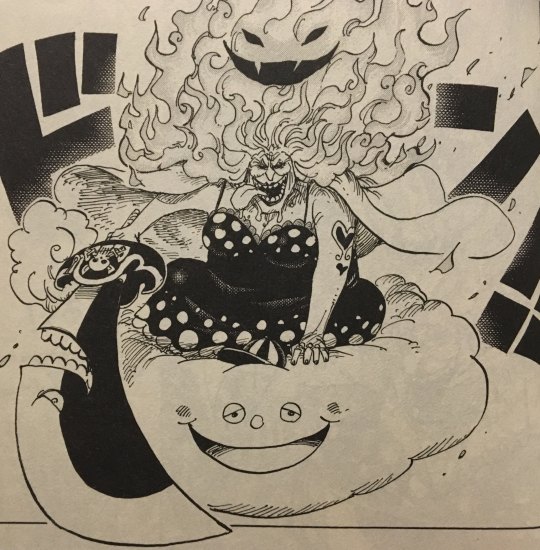
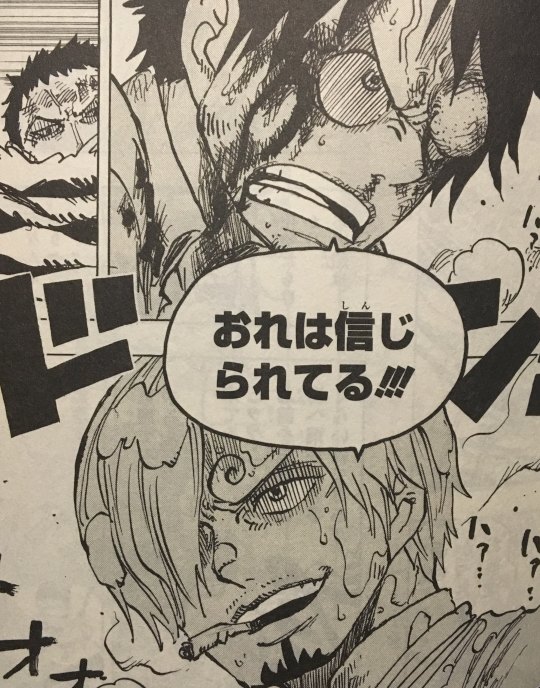
i do really love that the entire climax of whole cake island hinges on the degree of trust and faith the strawhats, and sanji and luffy specifically, have in each other. they’re all facing massive challenges that would seem insurmountable to an outsider- luffy facing down a yonkou’s commander with a bounty of over a billion and sanji remaking a massive cake that took months to plan and make in just a few hours, the others evading big mom’s full forces and big mom herself for a full night- but none of them have even a shred of doubt that the others can manage it.
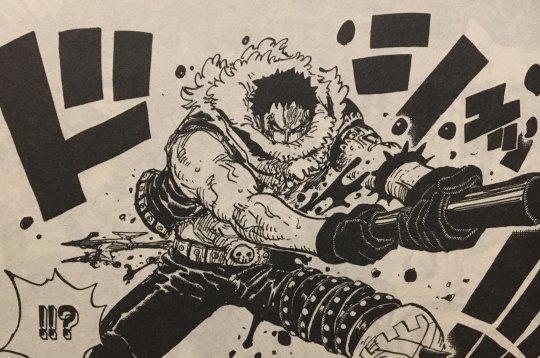
i wrote a meta post awhile back about one piece’s concept of ‘honor in a pirates’ fight, and what it came down to is this: honor can never be expected between pirates, but the best of them will show it anyways, and it can be a very telling judge of character. nobody would expect katakuri to do this, and luffy even calls him an idiot for it, but he has enough respect for luffy as a strong opponent to do it anyways, and that’s how we know for absolute certain that even though he’s an antagonist, he’s also a good, honorable person.
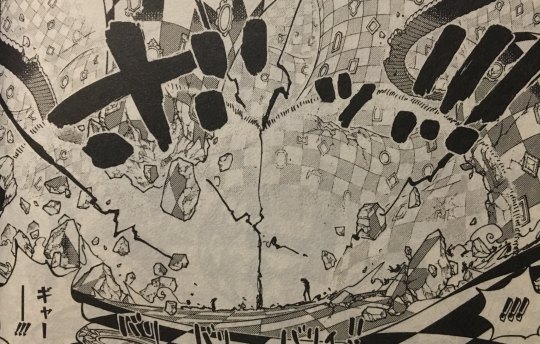
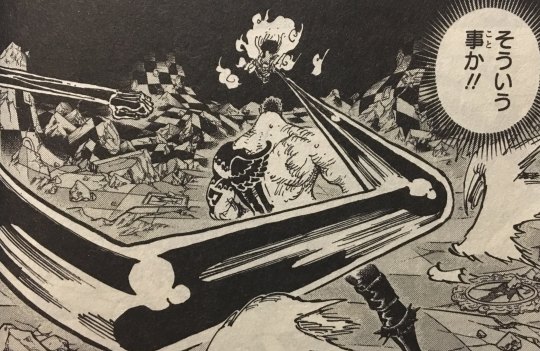
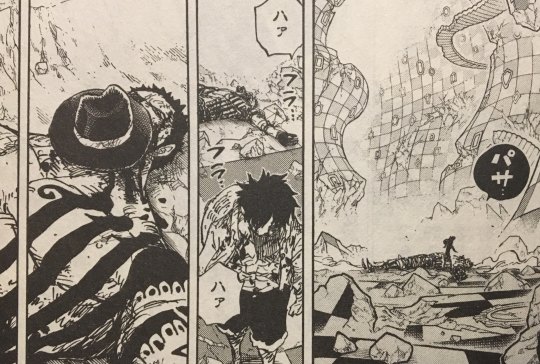
i really like the gesture of luffy leaving his hat over katakuri’s mouth, especially because until this point, we’re never even given any indication that he’s really noticed it, let alone that katakuri is insecure about it. he never reacts to or comments on it (which is in itself kind of unusual from someone who tends to nickname opponents by their appearances as often as luffy does) one way or another.
and then he does this, confirming all at once that he did fully notice and understand, he just doesn’t care. which i think sums up one of the more under-appreciated aspects of luffy’s character- he’s generally way more observant than people give him credit for, especially when it comes to people, it’s just that he has a very different sense of what’s important and what’s not than your average person.
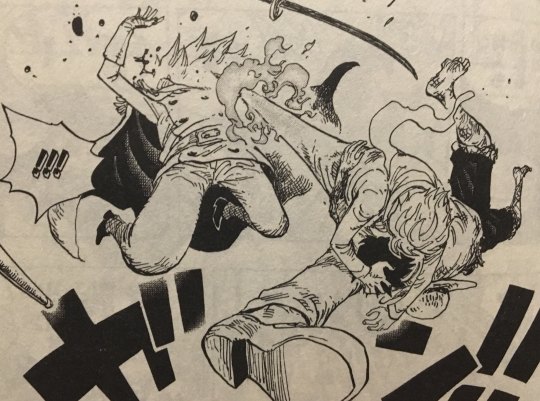
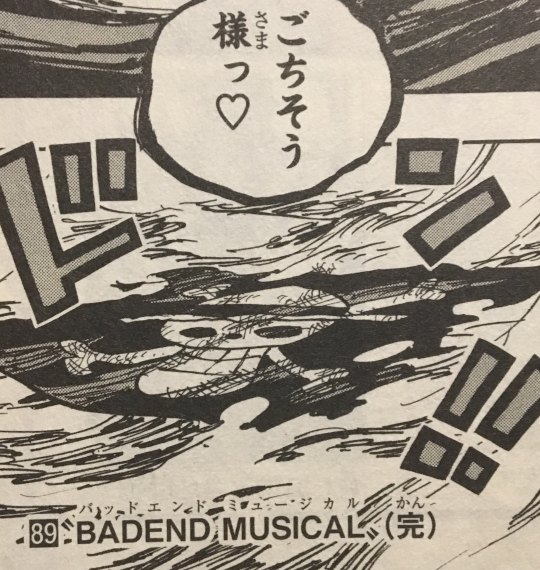
i love the sheer contrast between big mom’s delighted, rapturous singing as she devours the wedding cake against the violence taking place on screen as her army rains fire and hell down on the thousand sunny. it parallels her initial introduction at the start of the arc perfectly, and is just an excellent way to close out the arc with a bang.
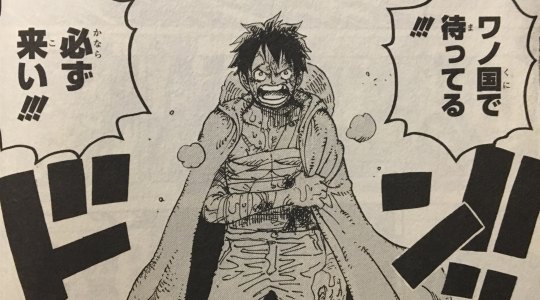
i said it earlier but it bears repeating here, for a different reason: luffy is not very physically intimidating. he’s shorter than most of the other main characters, he’s a lanky teenager, he dresses casually and his most identifiable accessory is a farm hat.
but then there are times when he looks like a captain, like a future pirate king, and it just looks so natural on him. i can never get over it.
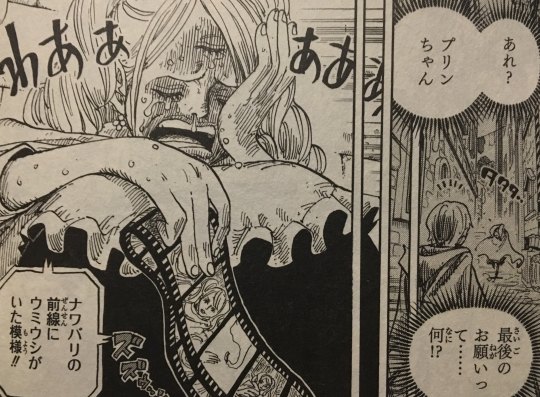
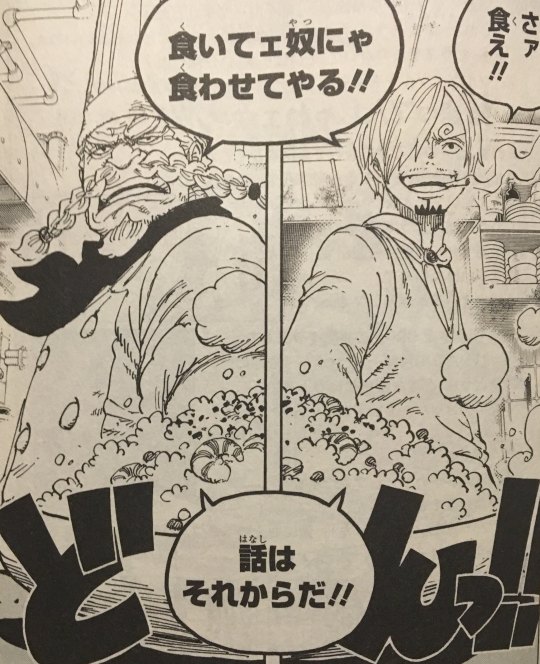
i really like that, after spending a whole arc demonstrating just how different (and how much better) sanji is than the vinsmokes, it ends like this- showing us just how similar he’s grown up to the man he’s chosen as his real family, and just how proud zeff would be of him.
257 notes
·
View notes
Note
Alright, so, I'm well aware that the antag series revolves around her and Hajime, but I kinda wanna know more about her relationship with Nagito, Mikan, and Kazuichi during the tragedy and after the neo world program
I'm really hooked to this series, but can you blame me lmao-
i can’t blame you nonny, antag reader series is literally all i think about anymore, literal brain rot. this is basically just like?? a character analysis essay type thing? i’m so sorry it’s so long, i just got soooo into it
Request for: antag reader (Mikan Tsumiki, Kazuichi Souda, Nagito Komaeda) Warnings: despair things, face swap mention, spoilers, manipulation and bad friending :( ~~~
Mikan Tsumiki (and like a pinch of Junko Enoshima):
The Tragedy: So basically the whole thing with (Y/n) is that her parents were just so overcritical to the point where it rooted her complex and felt like they never loved her, right? So basically, Junko was able to attack that by showing her the bare minimum affection and introducing Mikan into the mix, who was in a similar boat with being unloved. Junko made them both feel as though she was the best love they could ever have and then made them compete for it at any opportunity she could.
Mikan always loved Junko but she doesn’t love (Y/n) the same way and vice versa, despite that, they do both care for each other very deeply. They desire no relationship in each other and even view each other as rivals who happen to find somewhat of a friendship together. Mikan thinks, and always has, that (Y/n) is much more talented and worthy of Junko than she is. However, (Y/n), being deeply insecure far below the surface - never stopped thinking that Mikan was more beautiful and worthy of Junko than she was.
They find both comfort and hatred in each other due to Junko making them act as competition. They both know the pain of Junko’s rejection but they also both know that if the other was out of the way, they could have Junko all to themselves.
When (Y/n) found out Mikan took Junko’s womb, it was a betrayal due to the fact that she didn’t know beforehand, Mikan had never said anything about taking Junko’s uterus. And on top of that, she found out that Mikan had tried conceiving a despair child during their separation. Even though neither of them loves each other, they know their relationship can be viewed as lovers - they often view it as such themselves - and so, (Y/n) felt as though Mikan had cheated on her. She basically had. Even so, she still knows that nothing could make her hate Mikan, she doesn’t love her as she did Junko, but she loves her more than any other woman she’d ever known. Mikan is the only grounding she’s ever known and the only person to ever relate to her on such an intimate level.
Going back to the feeling of Mikan being prettier than her, (Y/n) stole Junko’s face entirely because of that feeling of inferiority. She never told Mikan because she was ashamed to admit that she was insecure, it would make her imperfect to be insecure.
Overall, she’s never loved Mikan as a girlfriend but they’ve always been all the other had during The Tragedy despite their ‘rivalry’ and insecurities surrounding the other.
After Neoworld: (Y/n) is definitely nervous to be around Mikan because of their history with each other and Junko. Before Mikan wakes up from the program she’s constantly worried about if the nurse will hate her or be disgusted by her. The way Mikan had treated her right before her execution hinted at some tenderness buried beneath discontent, but that could always change. When Mikan wakes up she immediately looks for (Y/n) on pure instinct.
They definitely try to help each other heal and cope with Junko’s manipulation and lies. They both have come to realize that Junko never loved either of them and they didn’t love each other - any of the comforts they had gathered in The Tragedy was a lie and they help each other through that realization.
“You’re more than what she made you.” is a common phrase between them because they know she only made them compete for her own entertainment and their despair.
It was cruel and they have to live with every emotional and physical scar from that time. But they still have each other.
Any sense of rivalry has dripped away from their bond and is now wholly intertwined by genuine friendship and connection. By their experiences and how they’re growing away from Junko and into themselves. Eventually, all their conversations stop being about Junko and healing and start being about a pretty shell Mikan found on the beach. Or how the water looks so inviting, they should go for a swim.
Or how the chairs need repainting.
Or how some flowers outside the front door would be lovely.
Or how good breakfast was this morning.
Kazuichi Souda:
The Tragedy: Kazuichi wasn’t as “enamored” with (Y/n) as he was Sonia, but he respected her Ultimate and higher intelligence enough to also refer to her as ‘miss’ when they went to school. Though he largely stopped calling her ‘Miss (Y/n)’ during The Tragedy he still respects her a lot and is even a little scared of her sometimes. Again, she’s way smarter than he is - she’s not a super genius like Izuru but she’s a smart cookie and he’s not so delusional to think he’s near her in intellect. So the fact she can copy his Ultimate status and be smarter than most people in their class is quite intimidating for him at times.
Because of the confidence she projects and her charisma and, again, higher intelligence than his, he often follows her word and example without much thought. Like if he saw her jump off a cliff, he would probably go along with it because he knows she probably has some plan to get out of the situation safely.
(Y/n) views Kazuichi sort of as a little brother - but one that follows you around like a puppy and always bugs you. She doesn’t expect much other than blind support from him and kind of accepts that he’s her “sidekick” so to speak. They didn’t view each other as equals or even true comrades - (Y/n) was always just better and that went unquestioned. She definitely used him to gain without putting much thought into the long-term of their relationship.
After Neoworld: Kazuichi had regained his memories in chunks as they left the program and at least could recall being so-called friends with (Y/n). When they awoke, they didn’t talk to each other that often since Kazuichi was extremely bitter about how she’d treated them all in the program (and him as a Remnant) and so she was left alone with Hajime.
It’s only as she actually begins healing and expressing more humane traits that he starts talking to her again. Neither apologizes for anything specific, they just aren’t those kinds of people and both parties can let it go easy enough - they’d both done horrific things and they know that. He invites her into his warehouse to take apart the Monokumas, he offers to go on walks along the beach with her - he finds it nice to be in her presence again.
Because even after what they’d been through, I feel like he does still deeply respect her due to her talent. He just also has gained more confidence in himself while in the program and therefore has more sense to not let her control his actions. Which, he finds that she hasn’t tried doing and that always encourages him to keep coming back.
Kazuichi thrives on positive feedback and (Y/n) knows this, so every time she can she’s expressing how much he means to her as a dear companion - both of them being hesitant to actually label themselves friends. Especially Kazuichi, who had already been hit by poor friendship and trust issues, remembering that (Y/n) used him during The Tragedy makes his brain go fuzzy on how he feels about her. Sometimes he’s angry and other times he forgives her wholeheartedly because he knows she’s sick and he wants her to be able to maintain the friendships that he’s able to.
I think it’s after she apologizes to everyone, pre-Nagito waking up but post Gundham and Nekomaru, that he really just lets go of everything.
It’s not easy to forget that he was just her tool but he knows that she’s better now and they start hanging out more often, by themselves, having a good ol’ time talking about absolute nonsense.
Respect turns into admiration.
Nagito Komaeda:
The Tragedy: So I’d already mentioned that (Y/n) influenced him into becoming Servant, but I wanna expand on that before digging into anything else. At heart, Nagito is a people pleaser to the Ultimates, and none more than the copycat who can master pretty much anything she wants. During their school years, she didn’t see anyone as her equal and that resonated with Nagito’s inferiority complex and while she hates people who have no confidence, she would hate to be like everyone else more. So she kinda just accepted the servitude that came with befriending Nagito on the first day of school up until The Tragedy where he practically begged her to take him with her wherever she went.
She was the first one to really hold onto his chain, both literally and metaphorically. He joined the Ultimate Despair with Junko to create a despair to overcome, but only (Y/n) was allowed to actually touch him - or else he started throwing a huge fit.
In order to spread despair and crush Nagito’s everlasting obsession with hope, she probably intentionally ignores and neglects him when he needs her.
This largely means when he’s mourning/remembering his parents and dog or his illnesses or when he’s falling into despair and needs her to pull him out, she’s just watching and doing nothing.
In fact, when Nagito had brought up his plans to join the Warriors of Hope he was really hoping she’d speak against it, and she didn’t. She actually encouraged it. Pushing him to leave her alone and join the WOH. It hurt, of course, it would, but he left all the same and they hadn’t spoken since despite their ‘friendship’. (Y/n) never bothered going after him, again to crush his love of hope.
She left him unhinged, alone, sick to fend for himself until he found the WOH, and even when he found them - she didn’t seem to care whether they let him live or killed him.
After Neoworld: Honestly? To say that she mourns Nagito, and her entire relationship with Nagito, is a huge fucking understatement. Especially as the others begin waking up and Hajime helps her grow, she just gets more and more depressed over her situation with Nagito. And as he takes longer and longer to wake up, she begins to accept that she was horrible to him and doesn’t deserve his forgiveness.
Before The Tragedy even, since they’d met. She always treated him with as little human respect as she could - she did it with everyone but especially him. He was basically just a little errand boy she liked to talk to and she didn’t treat him as more. During their time in despair, she was barely around for him, only holding him together when the others pushed her to do it because he was being annoying. She was so awful to the man she always claimed was her closest friend. And she wants him to hate her for it so bad.
Then he wakes up and he sees her and he smiles. He could never hate her and it only makes her feel worse.
Nagito sees how much she’s changed and he begins changing too, she tells him about how Hajime has helped her so much and he begins to follow her around with Hajime. She’s worried he’ll consider himself her lapdog again but it’s cleared up when he doesn’t run to her side one morning out of the few left before they leave.
In fact, it’s when he doesn’t speak to her for hours on end she realizes that every interaction they had was under his free will and choice.
He doesn’t do her chores for her. She doesn’t watch him fall apart silently. They talk like friends do. Not about how talentless people are worthless or how hope is all that matters but about how they can’t wait to rebuild their favorite hangout spots and make better memories there together.
They sort of have an unannounced “restart” where they just wipe the slate clean, mostly on (Y/n)’s part so she can treat Nagito how he deserves. As a true friend rather than a pawn.
#sdr2 x reader#nagito komaeda x reader#mikan tsumiki x reader#kazuichi souda x reader#anon chatter :)#antag reader
90 notes
·
View notes
Text
Wyrd Sisters
I'm home alone with my toddler right now, spouse won't be back till tomorrow. If this is a little out there, that's probably why!
Wyrd Sisters
First Read: Post-Grad School
Verdict Then: Interesting as the true starter for Granny Weatherwax, but ultimately a bit underwhelming
Verdict Now: Wow, I really loved this one. Character driven, with good character development, really fantastically dedicated to the bit without getting indulgent.
Wyrd Sisters is a hard book to describe. Pratchett basically takes a pastiche of Shakespearean & Grimm fairy tale references and weaves them together into something much greater than the sum of its parts, a loving homage to the power of words in general, and theater in particular. In some ways, I'm right in the target audience for this book: familiar with lots of Shakespeare & lots of fairy tales, really into live theater, and mildly obsessed with meta-textual story features.
As I reflect on the difference between my first read of this and this one, I'm realizing that one of my struggles with reading early Pratchett in the past has been that on my original reads, I bounced around *a lot*. This led to me encountering characters all out of order in ways that hurt the earlier books especially. Ultimately, I think this is a testament to Pratchett's genius, that recurring characters really do grow and change from book to book, in a remarkable way. But reading series essentially backwards, as I did with the Granny Weatherwax books, can then be frustrating or disappointing, because elements that you love in characters are missing...sometimes because they develop them in that book! But going through it front-ways, freeing myself from preconceptions, I get more the intended experience. Death in Mort is still poorly written though, even this direction. Not budging on that one.
Pratchett's characters aren't perfect, even the ones who "ought" to be, but he has so much compassion for them, even (perhaps especially) when he makes fun of them. Each of the three witches in the hands of another author could easily be one-note mouthpieces for clunky moralism. But here, they're each given full characters and growth. Magrat is a great viewpoint, and while he pokes fun at her preferences, by the end, she's come into her own and the jokes are gone. I could have done with fewer comments on her body, admittedly.
Pratchett's craft took a huge leap forward in Wyrd Sisters, especially at the sentence level. It's appropriate that a book about the power of words is itself a wonderful example of the written form. The storm on its own acting journey, the snippets of soliloquies (always just enough to give you the idea, never enough to spoil the illusion), the character of Lancre itself, really just excellent fundamentals. While in earlier books, it not-infrequently felt like he was trying to hard, over explaining some things and (mostly) under-explaining others, this book flows with a deceptive ease. Wikipedia informs me that Pratchett quit his journalism day job after Mort, and both Sourcery and Wyrd Sisters show it. They're so much more polished than the previous books.
I'm resisting just utterly splurging here about all the bits I liked in this book, and why. Introducing new people to Pratchett can be hard sometimes - his work is so varied, cuts across so many genres, themes, and even styles, that sometimes I despair a bit. But for anyone who likes remixes and reimaginings with more than a passing familiarity with Shakespeare's tragedies, Wyrd Sisters would be a great starter. The best starter book so far for just about anyone, I bet.
5 notes
·
View notes
Text
Runeterra Retcons 9: Shaco
The time has come to discuss League’s resident killer clown… Or killer jester, I suppose. There is a difference, not that it really matters because even the lore doesn’t ACTUALLY know what Shaco is. To be frank, Shaco is a weird character because he’s NEVER had a proper place in the story, even from his conception.
Shaco’s original lore paints him as a complete and utter mystery. Nobody knows who or what he is, where he came from, or what he really wants. All anyone has ever known is that Shaco loves killing people because he thinks it’s funny. He could be a demon, a rogue weapon, or just a homicidal madman who’s really good at what he loves. That’s where his character begins and ends, so there’s really not much to actually analyze here. Shaco’s second lore attempts to give us a little more detail but all it really does is say the exact same thing with more words added in.
Of course, Shaco’s first two lores were written at a time with the Institute of War and Summoners were still canon, so after the retcon back in 2015 Riot opted to give him a new backstory to make him fit in with the new world of Runeterra. That backstory, as we can see, is ultimately little more than a placeholder. I mean, his extended bio doesn’t even match the blurb on his Champion page!
In summation: Shaco is a haunted doll who belonged to an unknown prince of an unknown kingdom and was transformed by unknown magics for unknown reasons. This backstory now feels especially redundant with the introduction of Gwen into the game, a living doll with a similar backstory albeit far less evil. To be frank: there’d be room to have some interest thematic parallels between Gwen and Shaco if Riot had written these two in such a way that they were creations of the same person or belonged to the same kid but wound up becoming wholly opposite of one-another.
For example: perhaps in an alternate version of the lore, Gwen comes to embody the childlike innocence and hope of her maker/owner and seeks to spread joy and cheer while Shaco is a corrupt and perverted manifestation of those desires who seeks only to amuse himself in the suffering of others. This, I think, would have been a fantastic way to go about it, but given that Gwen is already so heavily tied to the Shadow Isles plotline and Viego is set up to be her primary enemy, I feel like it would be kind of difficult to work Shaco into that dynamic at this point.
Besides, it’s clear that Riot DOES have plans for Shaco: namely, that they aim to retcon him into being a demon. This is somewhat evident by his champion title, the Demon Jester, as well as his relationships are listed as being Nocturne and Fiddlesticks, the demons of nightmares and fear, respectively. There’s also that branch on the demon family tree labeled “Delirium” which would fit a murderous jokester pretty well.
To be honest, I was initially hesitant to even bother doing an episode for Shaco given that Riot clearly has at least some vague idea of what to do with him, but since reworks are coming out a lot slower now and Shaco’s not even on Riot’s priority list as far as we’re aware, it’ll probably be a WHILE before we actually see them do anything with this particular concept.
So, given what we know about Riot’s current plans, the general direction of this rewrite is simple: make Shaco a demon. Admittedly, though, that’s a little easier said than done. Demons in League are creatures who feed on mortal pain and suffering, but each of them has a different way of going about it. Fiddlesticks mainly uses paranoia and trauma to drive his victims mad while Nocturne takes a more Freddy Krueger approach of just invading dreams and turning them into nightmares. Tahm Kench likes to make Faustian Bargains by giving you everything you want and then tearing it all away from you, while Evelynn lures you in with seduction and then proceeds to tear you apart piece by piece.
Every demon takes a different form and has different ways of going about things, but all of them share a core concept: they feed on suffering and misery, be it physical or emotional. That said, there’s a bit more to demons in Runeterra than just that. See, back when Fiddlesticks was released, Riot went and released what the community has dubbed the “Demon Family Tree,” which appears to be a chart displaying the hierarchy of demons and different emotions that different kinds of demons can prey on.
Now, admittedly, there’s a LOT about this chart that we don’t currently understand, and frankly I wouldn’t be surprised if Riot doesn’t either. There’s a key that resembles the one around Zoe’s neck in the top-left, a bunch of circles in the top right we don’t know the meaning of, and a whole bunch of text written in what I think is supposed to be Old Noxian that we can’t currently decipher. There have been theories and discussions about this already, so I’m not going to get too deep into it, but the main takeaway, I think, would be the words on the chart that we CAN read: Fear, Delirium, Nightmares, Secrets, Bliss, Frenzy, and Obsession. There’s also the term “Azakana” at the bottom, though we know thanks to Yone that this basically just refers to a demon that hasn’t fully matured yet.
Tying the chart back to the demonic Champions in the game, it’s easy to piece together the connections that they each have: Fiddlesticks is fear, Nocturne is Nightmares, Raum (the demon bound to Swain) is Secrets, Evelynn is commonly believed to be Bliss, and Tahm Kench is most likely Obsession. That leaves Delirium and Frenzy untouched, which leaves us with two spots to fit Shaco into.
Now comes the hard part: the decision. Delirium refers to a state of mind in which one’s awareness of their actions or environment is significantly reduced, whereas frenzy is a sudden burst of frantic, uncontrolled emotion, typically rage or aggression. Either one of these could work well for a killer jester, but I personally think that delirium would suit Shaco better in terms of how his personality is portrayed in game. So, with that said, let’s dive deep into the realm of demonic and see what can be done to turn this cursed puppet into a proper Demon of Delirium.
It is often said that misery and comedy are but two sides of the same coin. Laughter often comes at the expense of others, and one person’s despair may be another’s delight. Most entertainers would tell you that walking the line between humor and malice is key, but to Shaco, such distinctions are a joke for which he himself is the final punchline.
The demon known as Shaco has stalked Runeterra for ages, spreading his twisted influence far and wide. There’s nothing Shaco loves more than to bring joy to those who need it most, often appearing to mortals who have experienced great loss or tragedy. Those coping with grief or misfortune may find themselves unexpectedly visited by a grinning jester, who assures that his only desire is to take away their pain with the power of laughter.
At first, Shaco’s antics are innocent enough. Some cheesy jokes to lighten the mood, some harmless pranks to lift the spirits of the downtrodden, all with an unyielding smile that one cannot help but start to imitate. Soon, those enthralled with Shaco’s antics are invited to play games with the jester to help distract from their worldly worries. Those who accept are whisked away to partake in a day of fun and merriment, playing all manner of pranks on friends, family, and even innocent bystanders.
When the games end, Shaco leaves his playmates cackling insanely in the aftermath, often surrounded by bodies and covered in blood. None laugh louder than Shaco, however, who delights in watching his playmates slowly regain their sanity and come to realize all the atrocities committed at his side. Some cry out in despair, while others break down laughing or crying harder than before. Some go mad, others are executed for their crimes, and some even opt to take their own lives. All outcomes are equally hilarious to Shaco, who soon sets out in pursuit of his next playmate.
Stories of the Mad Trickster exist all across Runeterra, often told as children’s tales to teach valuable lessons: don’t trust strangers, never give in to sadness or despair, and always be mindful to never take a joke too far. Few truly believe in Shaco’s existence, but those who fail to heed such warnings may find themselves to be his next playmate, as well as the butt of his joke…
So, this one was a bit shorter than normal, but I think it serves to get the point across. As the embodiment of delirium, I wanted to give Shaco a set-up sort of similar to Tahm Kench: he appears to offer help to those in need, only to end up ruining their lives in the long run. The difference, of course, is that Shaco lures people in to help them forget their troubles with fun and games, only to escalate to full-blown murder and mayhem.
In essence, Shaco drives others to delirium, making them believe the carnage is all just fun and games until his spell is broken and reality sets in. I’d like to think he particularly likes preying on the downtrodden because those who are suffering mental anguish already are easier for him to cast his spell on.
This is just my take on Shaco, though. Who can really say what Riot will do with him in the future? Who knows, his rework might end up even better than what I have here, but of course, anything is bound to be better than his current, non-existent lore.
20 notes
·
View notes
Text
So who is Red, really? (pre-8.22 theories)
Since this is perhaps our last opportunity to discuss who Red really is, and because I've been rewatching clips from The Blacklist S1-4, I wanted to look back over a few things before we (or hopefully Liz at least) find out Red's true identity in 8.22.
I'm going to make a series of statements, and then list on a scale of 1-10 how likely I think each statement is (with 10 being the most likely). And then I'll give a brief explanation for each.
Red lost his family before he took on the 'Raymond Reddington' identity.
10 / 10 - Red has stated multiple times that there are truths that he needs Liz's help to uncover. The truth about what happened to his family, which was brought up several times in Season 1, seems to be foremost among them. We know that Red suffered a great tragedy, which sent him down a path of revenge. Maybe this was part of the reason why he took on the 'Raymond Reddington' identity. It could also be that, like Katarina, his wife was someone he was told to marry to maintain his cover, so he didn't really love her (as he doesn't seem to talk about her or remember her at all). But, he truly loved and adored his daughter (bubble girl), and both of them were killed before he became 'Raymond Reddington.'
Red knew/knows Katarina Rostova personally.
9 / 10 - While he's seemingly gone back and forth on whether he believes Katarina was really dead, which I will attribute to retcons by TPTB, he knows a lot of things about Katarina that most people wouldn't know. For instance, when Liz finds out she’s pregnant, Red recounts how Katarina dreaded having a child and almost aborted it. That's something no one would know unless Katarina told them. He likely knew her before the Night of the Fire, because he told Kate that he was not as unfamiliar as she expected when he recruits her in S4's "Requiem." Ultimately, based on 8.21, it seems that -- barring Redarina being true (ugh) -- that Katarina recruited Red to take on the 'Raymond Reddington' identity. So, that's likely when she gave him all the information he would need to keep Masha/Liz safe and successfully impersonate the real Reddington.
Red knew the real Reddington personally.
7 / 10 - This one still seems likely, in my mind, but it's not a guarantee. It's possible that whenever KR recruited Red to take over the 'Raymond Reddington' persona, she gave him all the information he would need to be successful. Then again, Red has been impersonating him for 30-ish years; he knew of and briefly interacted with Reddington's family in Carla/Naomi and Jennifer. So, it's a strong possibility, but not a certainty. Perhaps he was acquainted with Reddington, but wasn't close with him like he seemingly was/is with KR.
Red knew Sam Milhoan personally.
6 / 10 - After rewatching 1.08, I'm unsure whether Sam knew Red was an imposter. Maybe when he said that he needed to tell Liz the truth, he was referring to the truth that 'Raymond Reddington' was Liz's dad. And, Red, being an imposter, couldn't let Sam do that. But, then again, Sam definitely knew the real Reddington. And we know he and Red were in touch in S4's "Requiem," when Red asks Sam to help him recruit Mr. Kaplan. You'd think that if Sam knew Reddington well enough that Reddington AND KR both trusted him, that he'd be able to spot Red as an imposter. So, it seems likely that Sam knew Red is an imposter and not the real Reddington, Sam's late friend. But, did Red know Sam before he took on the 'Raymond Reddington' persona? It seems likely based on how they talked in 1.08, but again, not a guarantee. It definitely seems like he was at least in touch with Sam on a regular basis after Sam adopted Liz.
Red was an American agent who spied on the Russians.
3 / 10 - Red does tell a lot of personal stories that are set in the United States. But, as I've speculated recently, perhaps he's only using American place names / people names so as to impersonate the real Reddington, but then the details are based on his childhood elsewhere (presumably Russia).
And then we do have the very first line in the show where Mr. Gray says, "Must be good to be home again, sir." So, as I've said before, this line is very confusing because we know Red has been coming and going from the United States for decades. So, Mr. Gray isn't referring to the United States in general. Maybe he means DC specifically. Could be. Maybe Red hasn't been in DC much since he became a criminal, but that seems unlikely given how much crime and intelligence is based in this show's version of DC. So, maybe Mr. Gray meant the FBI building specifically??? Not sure, especially because I'm unsure whether Mr. Gray knew Red was an imposter.
Ultimately, though, maybe Red was an FBI agent who worked with Reddington and infiltrated the Russians. Maybe he has a Russian background. Maybe his mother and/or father was Russian, but immigrated to the United States. So, the FBI or Navy or whoever decided he would be useful because he knew the language, the culture, etc., and they could use his family connections to help him get in and out of Russia without much thought.
But, if Red was an American agent who was spying on the Russians, you'd think the U.S. intelligence network would know more about KR. Red was clearly very close with her, and if he was there the Night of the Fire, it meant she trusted him. So, either Red was a really bad American agent OR he was a double-agent, which doesn't fit with Red's tenet of loyalty.
Red was a Russian agent who spied on the Americans.
5 / 10 - I give this a slightly higher chance than the reverse, because Red seems to know a lot of Russians that even most Russians don't know. He knows/knew Katarina, Dom, Ilya, Katarina's handler (whose name escapes me), and Tatiana (aka Fake KR). After all, Red said that KR was a ghost and most in the intelligence community -- whether U.S. or Russian -- didn't know what she looked like, hence why Dom and Ilya tried to use Tatiana as a fake KR.
Of course, maybe he only met these people after KR sought him out. Who knows? But, then again, it seems a little more likely that he’s Russian-born rather than American-born. After all, he did have a lot of Russian things in his Bethesda apartment in S2, and that was his private hideaway that no one knew about, where he could presumably be himself and not 'Raymond Reddington.'
Red was a Cabal agent who spied on the Russians and the Americans.
7 / 10 - While I'm not sure whether Red grew up in the U.S. or the Soviet Union, I ultimately think he worked for the Cabal. It would explain how he knew KR and Ilya. It would also explain why he was presumably there the Night of the Fire (as he has the burn scars on his back) -- because KR trusted him to help her get the Fulcrum back. It also explains what happened to his family. Think about it: the Cabal knows that valuable information was compromised by KR and is now in the hands of Raymond Reddington, both of whom are either deceased or in hiding. So, they had to take revenge on someone. So, assuming Red was an associate of KR's and was unable to find the Fulcrum, perhaps they blamed him or at least wanted to make an example of him. So, his family is killed, and KR finds out someone she trusts has a reason to hate the Cabal as much as she does. So, she recruits Red to become 'Raymond Reddington' as a way to take revenge on the Cabal and protect Liz from suffering the same fate his family did.
Red is responsible for Katarina's death.
6.5 / 10 - Based on his "just a nice gesture" monologue, Red feels that he has taken something away from Liz. And thanks to "Cape May," we know he had to make a choice whether to save KR or Liz/Masha. We figured that was during the Night of the Fire, but KR didn't die in the fire or at Cape May. So, based on 8.21, everything is accounted for. Liz killed her own father, so Red didn't take him away from her; and KR was still alive when Liz was placed with Sam and eventually created 'Raymond Reddington.' Presumably, either during or after KR and Red created 'Raymond Reddington,' something happened, KR died, and Red felt responsible. But, then that conflicts with Red's S3 line about how he's unsure what happened to KR, even if he later tells Liz that her mother is dead. Plus, Dembe did say something about "what (Red) did to Katarina." So, while there have been retcons, I do think KR is dead and that Red (feels he) is somehow responsible for that.
TLDR: who do I think Red really is?
I think Red has a Russian background -- either he's from the Soviet Union or his parents were. I think he was supposed to be spying on the Americans for the Russians -- so he, his wife and daughter lived in the United States -- but he ultimately worked for the Cabal. He likely worked very closely with KR, was acquainted with the real Reddington and probably met Sam at some point pre-Night of the Fire. When KR's team didn't recover the Fulcrum, Red was blamed / made an example of because KR and Reddington had disappeared. So, his family is killed and KR uses his desire for revenge to recruit him to become 'Raymond Reddington.' She gives him all the information he might need and asks him to help her protect Liz, which he agrees to because he doesn't want another innocent to suffer like his family did. At some point, KR dies and Red feels responsible, so he doubles-down on looking after Liz because he feels that he took something away from her.
#lizzington#the blacklist#nbc the blacklist#raymond reddington#elizabeth keen#liz keen#red reddington#nbc blacklist
18 notes
·
View notes